#just went with that one cos i saw that kyle maclachlan was in it and literally just yesterday i was telling my dad id never heard of him lo
Note
movie buff questions: 33, 34, 50, 7
thanks!!!! <3
7 (have i ever been such a fan of an actor i watched everything they've been in?) - kinda lol? i'm pretty picky when it comes to films and when it sounds like something i wont like then i dont go near it, even if it has an actor i like... but i def have gone out of my way to watch things when i know certain people are in it lol
33 (an overrated movie) - oooh boy ok people might hate me for this but: Casablanca lol... i watched it a couple yrs ago and it was just so BORING lol i really couldn't understand why people rave about it so much... (and like it's not cos i dislike old films, it's just that one wasn't that great pfft...)
34 (an underrated movie) - ok so i was looking through letterboxd to see what films few people had seen and apparently only 1.2k people have seen 'a touch of pink' and it's honestly such a cute and silly queer film! i haven't seen it in a long time so the details are hazy but i remember having a lot of fun with it lol
50 (first film i remember seeing at the cinema) - oh man you're asking someone who has the worst memory in the world pfft... one of the first i kinda remember was shrek the 3rd lol (i was 9) but i'm sure i went before then...
#ask games#there was a lot more i couldve included in the underrated category tbh lol...#just went with that one cos i saw that kyle maclachlan was in it and literally just yesterday i was telling my dad id never heard of him lo#(he plays the ghost of cary grant btw... trust me it makes sense in the film)
3 notes
·
View notes
Text
New tag game: Post pictures of your first ever (fictional/celeb) crush to the latest one and tag five others to continue the game
Thanks to @minmoyu for tagging me and ooof, are you sure you’re ready for this?!! :D I have been around/in fandom for a loooooong time and at first I thought, okay, no way I can list all my crushes, there have been SO many and we’ll be here all day but then as I started compiling a list I found I was having fun reminiscing and decided, what the heck, yeah, let’s do em all... or at least all I can remember! :D
There have absolutely for sure been other more minor crushes and passing fancies along the way, but these are the big ones that I remember (and that, in more recent years, I can track by going through my posted fanfics on AO3 and even *shudder* FFNET and seeing which shows I was into enough to want to write fic about the characters).
[Quick note: with rare exceptions, for actors I am listing them by the character they played rather than just the actor. Whilst there are actors that I like in multiple roles (and conversely, characters who on paper I would normally be into but are played by actors who do nothing for me, and hence the character generally does nothing for me either), for the most part it is the character I really have the crush on.]
I’m going to put this under a readmore cos it has gotten ridiculously long:
So... without further ado:
1. MORTEN HARKET from a-ha - OKay so, dating myself badly here but... I had the *biggest* crush on Morten Harket when I was a teenager. Pretty much the entirety of my side of the bedroom I shared with my sister was covered in posters of a-ha, and Morten in particular. I even had a heart-shaped Morten Harket pillow! :D I loved a-ha’s music (still do!) and I wanted to go see them in concert when I was 14 but my parents wouldn’t let me (*sob*). I did finally get to see them in concert in the early 2000s and they were BRILLIANT live (and Morten was still very very pretty)!
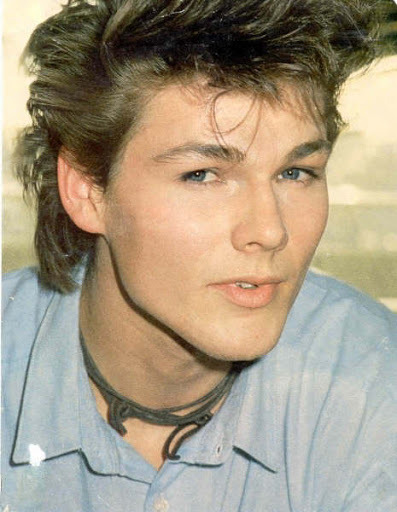
2. RICHARD DEAN ANDERSON as MACGYVER - MacGyver is the first tv character I remember being really into and having a crush on, to the extent that I would record episodes of the show off the tv (onto VHS tape - yes, I am *that* old!) so that I could rewatch them (especially the ones where he got hurt - yeah, I was a whumper even then! :D)
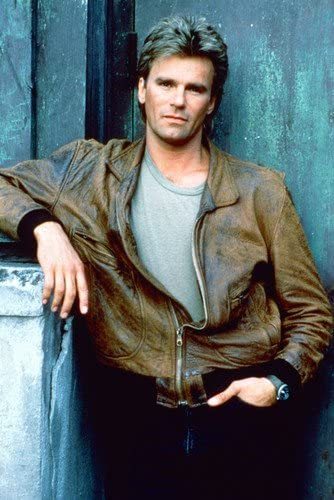
3. KEIFER SUTHERLAND - One of my rare exceptions. I think I first saw him in Lost Boys (and loved him in that film) but it was his role as Doc Scurlock in Young Guns that really made me fall for both the character and him. I definitely remember seeking out any and all films he was in and buying any magazine he was interviewed in (and knowing far more facts about him than was probably healthy! :D) and even drawing a fanart portrait of him. :)
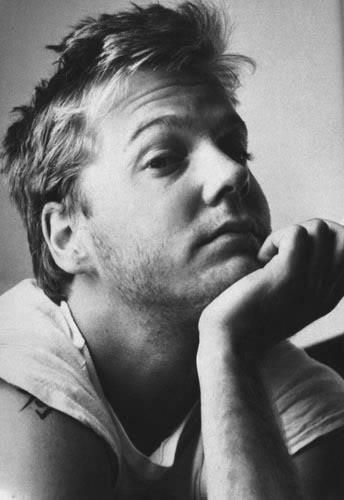
4. KYLE MACLACHLAN as SPECIAL AGENT DALE COOPER - I remember hearing about Twin Peaks before it started airing in the UK and it sounded so different and interesting... I watched it from the very first episode and very quickly developed a crush on Coop.
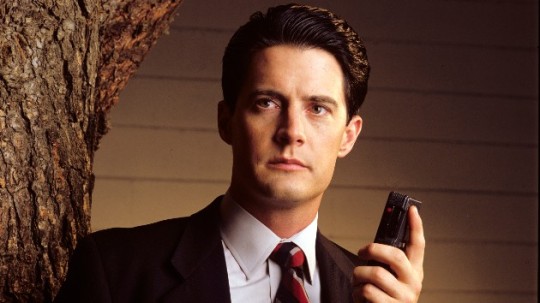
5. BRENT SPINER as DATA - I think ST: TNG had been airing for a while before I stumbled across it but I quickly became hooked and Data was my favourite character right from the start. I definitely remember at one point buying an (unofficial) episode guide book so that I could look up which episodes were good Data-focused ones (especially ones where he got hurt! :D) so I could go out and buy the videos that had those episodes on (at the time the show was available to buy on VHS-tape with 2 episodes on each tape).
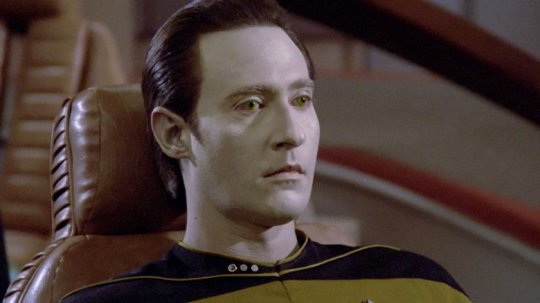
6. DAVID DUCHOVNY as FOX MULDER - Another show that I heard the buzz about and started watching right from the start and, like so many others, I immediately developed a crush on the snarky, enigmatic, troubled FBI agent with the weird name. The X-Files was the first show I ever tried writing (one, never-finished) fanfic for.
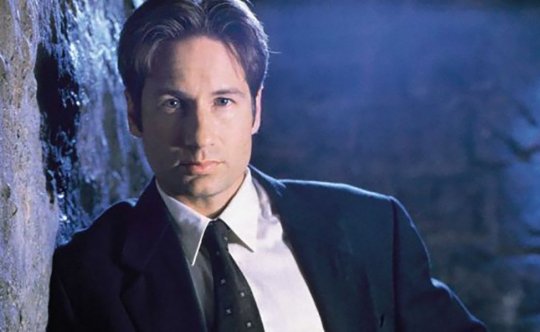
7. PAUL GROSS as BENTON FRASER - Man, Due South was such a good show! It was so quirky and clever and funny and Benton Fraser, with his huge heart and his serious demeanour and his gorgeous blue eyes, was just so darn attractive! He also got whumped a fair bit too! :D Due South was also the show that introduced me to the music of Sarah McLachlan (I was enough of a fan that I bought the show soundtrack on CD).
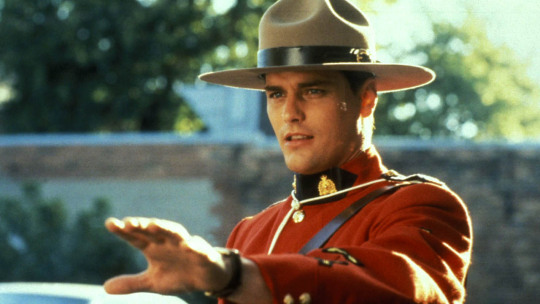
8. HUGH LAURIE as DR GREGORY HOUSE - This was a bit of an odd one for me because I had grown up knowing Hugh Laurie solely as a comedian/comic actor, known mostly for playing buffoons and genial idiots. And suddenly here he was with stubble, an American accent, and a limp, and he was hawt AF! :D It caused quite the feedback loop in my brain for a while which pretty much went “Wow, House is hot.... but it’s Hugh Laurie... but he’s hot... but it’s HUGH LAURIE!!1!”
I *loved* House (the first few seasons, at least) and oof a character with persistent pain (and a self-destructive streak a mile wide!) was a whumper’s dream. House was the first show for which I wrote - and published online - completed fanfics.
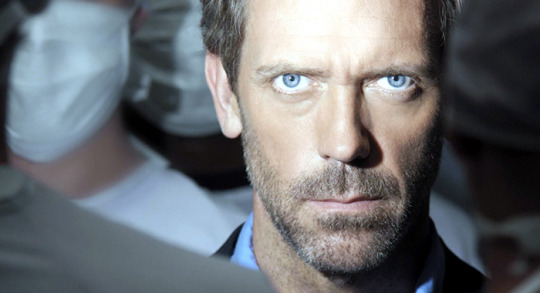
8. JOE FLANIGAN as JOHN SHEPPARD - Stargate Atlantis was my first proper online fandom, the first show I prolifically and repeatedly wrote fanfic for, and the first time I ever met in person an actor I was a big fan of (and while the show was still airing, to boot!). It was also my first introduction to the online community of whumpers! A bunch of us from the Shep Whump thread on Gateworld heard that Joe was going to be at a convention in London and we decided to book hotel rooms and meet up and go to the convention together and it was AWESOME! I can still remember seeing Joe *in person* for the first time and just,,,, struggling to believe he was actually here, in person, in front of me! He was super super lovely and humble too and took time to chat to everyone at the signing table and I clearly remember my brain just pretty much fritzing out during the photo session and being intensely aware of the sensation of Joe’s hand on my shoulder....
It was also super lovely to meet fellow fans, and online friends, in person for the first time and we had so much fun, and it kickstarted me going to lots of other conventions, including specific Stargate/SGA ones where I got to know lots of other lovely fans and online friends. I’ve met Joe about 4 or 5 times in total now and he’s been lovely every time.
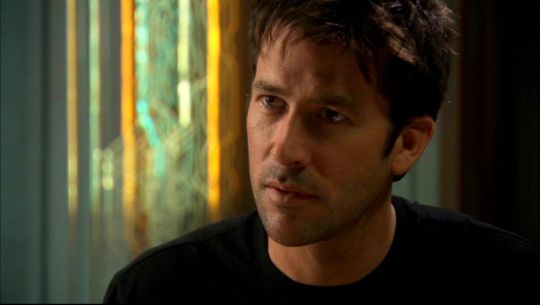
9. PAUL BLACKTHORNE as HARRY DRESDEN - Gosh I loved the shortlived tv adaptation of The Dresden Files. I loved the fantasy aspect, the stories, the humour, and I especially loved Harry Dresden and how often he got whumped! :D
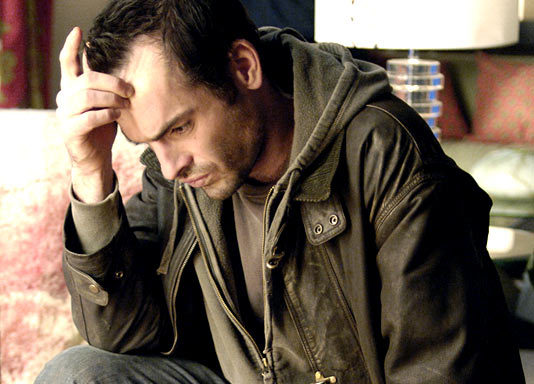
10. DAVID TENNANT as THE 10TH DOCTOR - I had watched the Christopher Ecclestone revival of Doctor Who and enjoyed it well enough but I can clearly remember watching David Tennant’s first episode as The Doctor - on Christmas Day, at my brother-in-law’s house - and being aware, as I watched it that... ooookay, yes, I’m in trouble here... I like him... I like him a lot... :D I mean, I’m sure the fact that he got whumped so thoroughly in his very first episode had nothing to do with how quickly I fell for him... right? :)
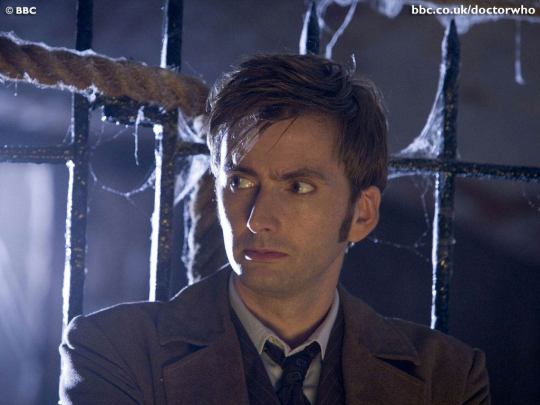
11. ALEX O’LAUGHLIN as MICK ST JOHN - Another show that ended far too soon and just as it was getting *seriously* good. But also a prime example of my point about having a crush on the character not the actor. I looooooved Alex as Mick St John... and yet in Hawaii 5.0 he pretty much does nothing for me (the character is too stoic and the whump often too unrealistically glossed over). Anyway, in Moonlight he was my favourite kind of character - angsty, brooding, dangerous AF when he needed to be... and essentially immortal so you could whump the heck out of him and he’d recover so you could whump him again! :D
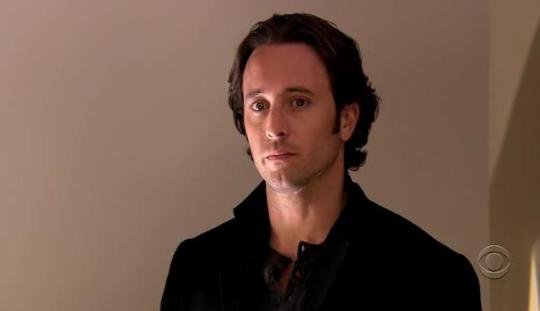
12. SIMON BAKER as PATRICK JANE - There is so much to love about Patrick Jane... his smarts, his sass, his angst... and Simon is a rare “against type” blonde crush for me (you may have noticed by now that most of my crushes follow a similar physical aesthetic - tall, slim/wiry, and dark-haired) and again here I think my crush is almost all to do with the character rather than the actor.
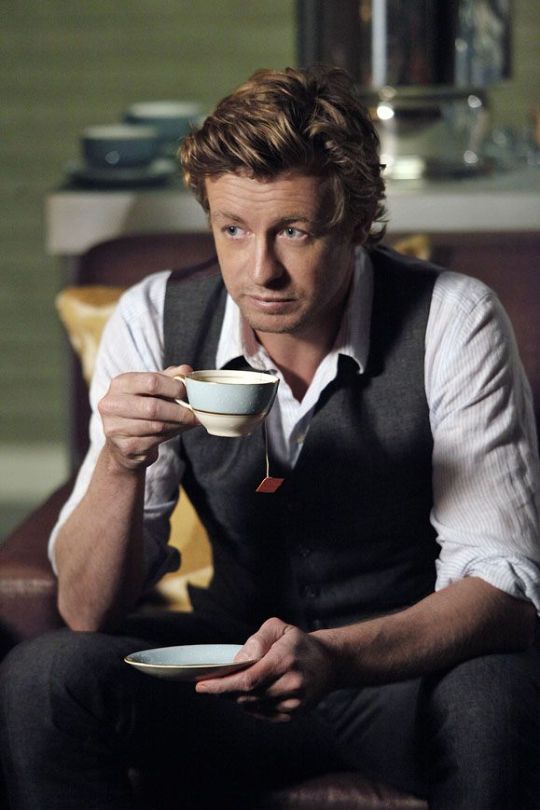
12. BENEDICT CUMBERBATCH as SHERLOCK HOLMES - I’m almost ashamed to admit it, given the clusterfuck that both the show and its fandom became, but in the earlier seasons I had quite the crush on Benedict’s Sherlock (and okay, a little bit on Benedict himself - I did definitely enjoy some of his other roles too). It helps that I was already a huge fan of the Sherlock Holmes character (I’ve read all the stories and novels multiple times and was a big fan of the Granada adaptation starring Jeremy Brett - whose Holmes would definitely count as one of my more minor/passing crushes) already. Benedict is another crush that I have met in person, at a (actually, the first!) Sherlock convention and he was lovely in person - very genuine, very articulate and thoughtful.
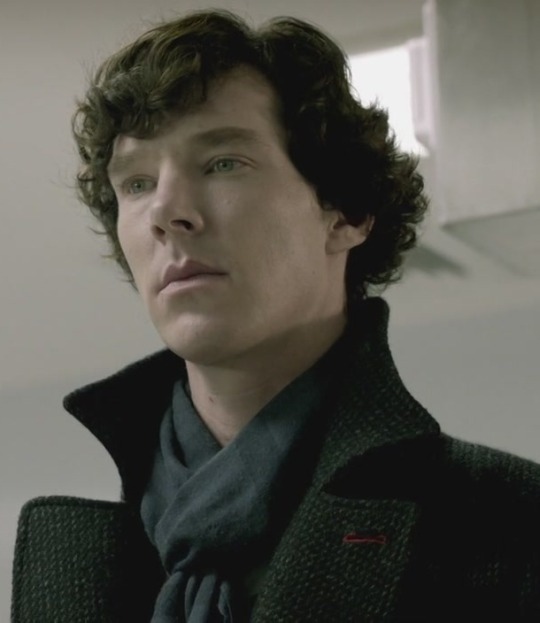
13. TOM MISON as ICHABOD CRANE - I was excited for Sleepy Hollow as soon as I heard about it and I was SUCH a fan for the first couple of seasons (before TPTB completely destroyed it and it inevitably got cancelled (I didn’t even watch the last season and a half)) and Tom’s Ichabod (and his amazing chemistry with Nicole’s Abbie) was a large part of why. I also quickly became a big fan of Tom himself as he came across as so witty and self-deprecating and *fun* in all the behind the scenes/convention clips etc. I was lucky enough to also meet Tom at a convention and he genuinely is that witty and charming and lovely.
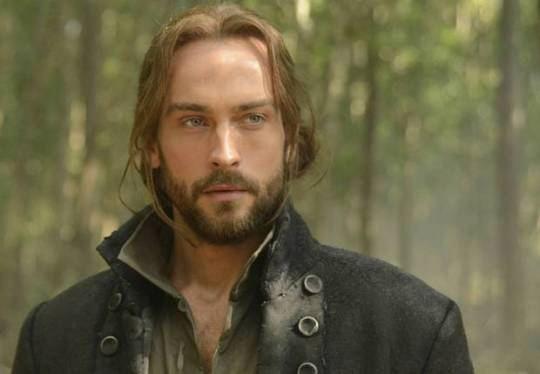
14. TOM WISDOM as ARCHANGEL MICHAEL - I think Dominion was possibly the first show that I got sucked into by seeing whumpy gifsets on tumblr! :D It was such a great show and also to date the most immersive, welcoming, cast-and-crew-interactive fandom I have ever been in. The cast and crew regularly live-tweeted the episodes, and interacted with fans on Twitter, and it was SO much fun. And Tom’s Michael was my favourite character right from the start - seemingly aloof but so much going on under the surface... and some really nice whump, especially in season 2! I was heartbroken when it was cancelled after only 2 seasons (and just as the plot was getting *really* interesting).
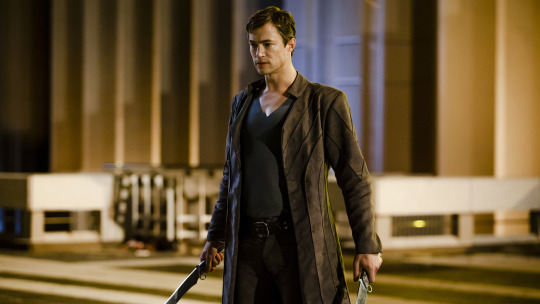
15. OLIVER JACKSON-COHEN as LUCAS - I was hooked on Emerald City right from the first episode. It was visually stunning, so atmospheric, and really intruiging. I love love loved Adria Arjona’s Dorothy (ngl, I had a bit of a crush on her too) and she and Lucas together were just... *chef’s kiss*. I mean... what an introduction to a character... she finds him crucified, bleeding, his wrists tied with barbed wire, and amnesiac.... and the whump only gets better and better from there on in! Like the entire first two episodes are just... Lucas whump! :D And his devotion to her... Emerald City was honestly the first show where I really got into a ship. I was *invested* in Dorcas, dammit! Aaaand sadly another excellent show that never made it past its first season.
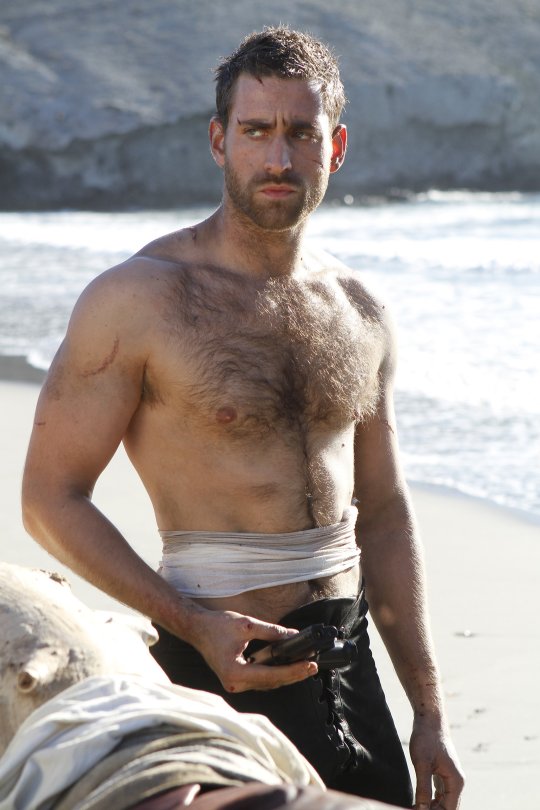
16. JASON RALPH as QUENTIN COLDWATER - Another show that I watched right from the start, was heavily invested in.... and that the writers absolutely tanked and destroyed in later seasons. *cries* Quentin was such a brilliant viewpoint character for the show and I loved his awkwardness, and his angst, and his enthusiasm, and his adorable floppy hair... and how often he got whumped!
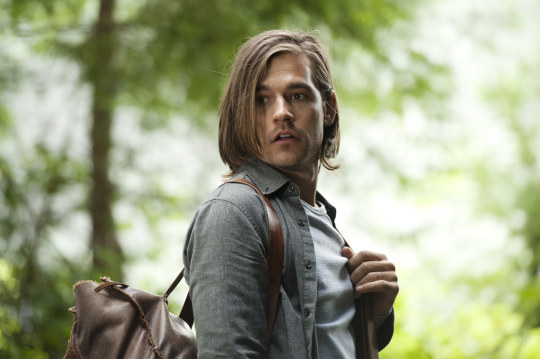
17. COLIN MORGAN - I fell for Colin in Merlin (which I stumbled upon late, long after it had finished airing, and hence was able to binge-watch the entire 5 seasons!) and liked him enough to seek out his other works, such as The Fall, and Humans, and The Living and the Dead, and he was brilliant (and very pretty) in all of them... and his characters also seem to get whumped quite a lot! :D
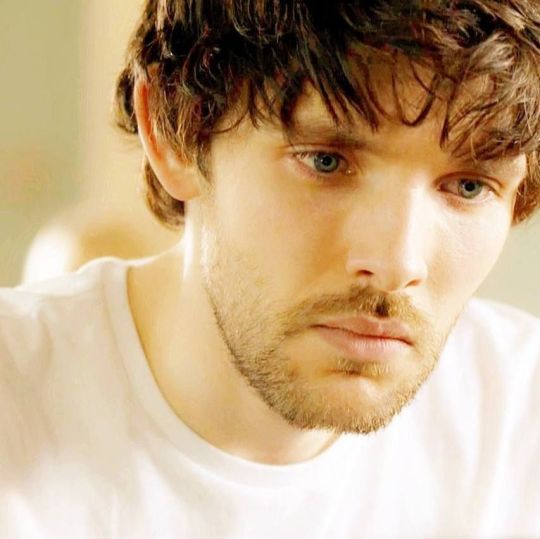
18. MATT LANTER as WYATT LOGAN - Wyatt was another of my favourite archetypes... absolutely badass and competent... but also tortured and angsty and capable of intense devotion. Another show that I watched because of whumpy gifs on tumblr and the second ever show where I actually got invested in a ship - Lyatt all the way, baby!! :D - aaaaaand yet another show cancelled before its time.
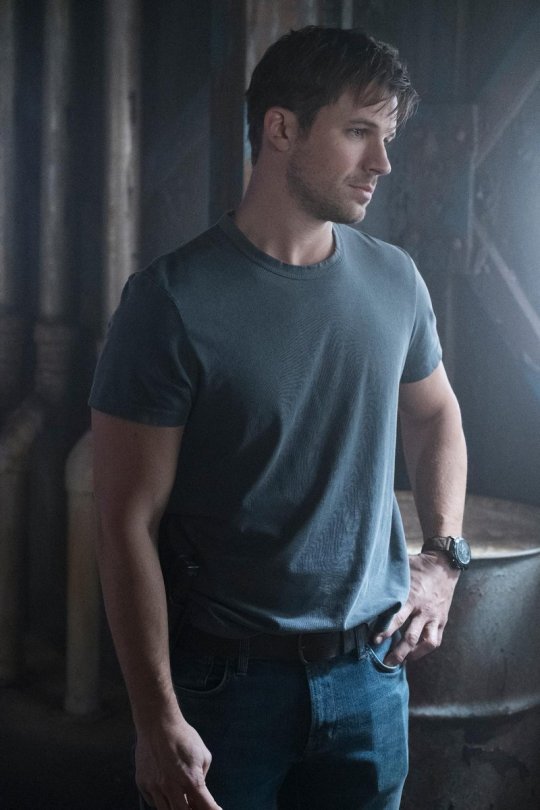
19. NOCTIS LUCIS CAELUM from FINAL FANTASY XV - my very first video game crush! I was recommended to play FFXV by fellow whumpers on the whumpshire discord because it was whumpy... and they were not wrong and I loved the game and I absolutely adored Noctis. FFXV is one of very very VERY few video games that I have actually played right through to the end. And possibly the only video game that has ever affected me to such an extent... I became so invested in the characters and their world and I actually found the last couple of chapters really hard to play because it was actually upsetting me emotionally. I had to take a break for a couple of weeks before I could go back and finish it!
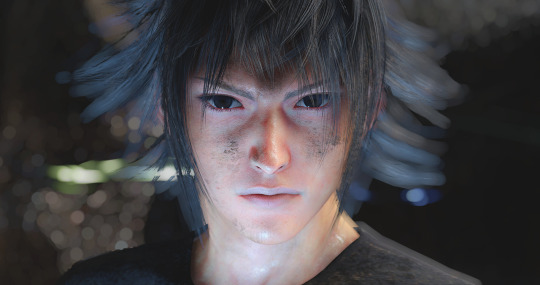
20. CONNOR from DETROIT BECOME HUMAN - and from there I jumped straight into another video game crush! DBH was another game recommended to me for its whump potential and I, and many others, immediately fell in love with the quirky, sassy, self-sacrificing (if you play the game right!) “android sent by Cyberlife”. The game itself is really good too... although, I have tried to play through all the different endings to the story but have never yet managed to make myself play the machine Connor storyline.... I want to complete all the story branches... but I also just want Hank and Connor to be friends and to be happy! :D
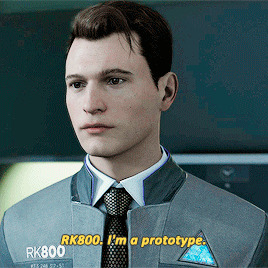
21. ZHU YILONG - Ahhh... the beginning of the asian drama arc of my fandom life! I first came across Zhu Yilong after getting sucked into watching Guardian because of pretty (and whumpy) gifs on tumblr... and I’ve never looked back. He is one of the rare entries where I am pretty much guaranteed to like him in pretty much anything he does and my crush extends beyond Shen Wei, or his other characters, and into reblogging his fashion shoot photos, and keeping up with news of his work in general. He’s just... so darn pretty! And also so... blur! :D And the behind the scenes stuff and interviews of him with Bai Yu, during the Guardian era, just made me fall for him all the more. He’s also ridiculously talented - not only a fantastic actor, but a really good singer (I love his singing voice), he plays guitar and piano, and he can paint too!!
He’s also pretty much what made me start learning Chinese... because after Guardian I went seeking his other dramas to watch... only to find that many of them are only partially, or not at all, subbed. So I thought... why not try learning Chinese and then I’ll be able to watch his other shows? :D

21. JI CHANG WOOK - My first kdrama crush, and what a good one to start with! Healer was the first drama I ever watched and can you blame me for falling for JCW... especially when I followed up Healer with The K2?! I’ve liked him in pretty much everything I’ve watched him in. Although I do wish he would go back to doing more action-based shows as he is sooo good at them... but he seems to prefer the romcom genre these days, which is something I am nottt always a fan of tbh.
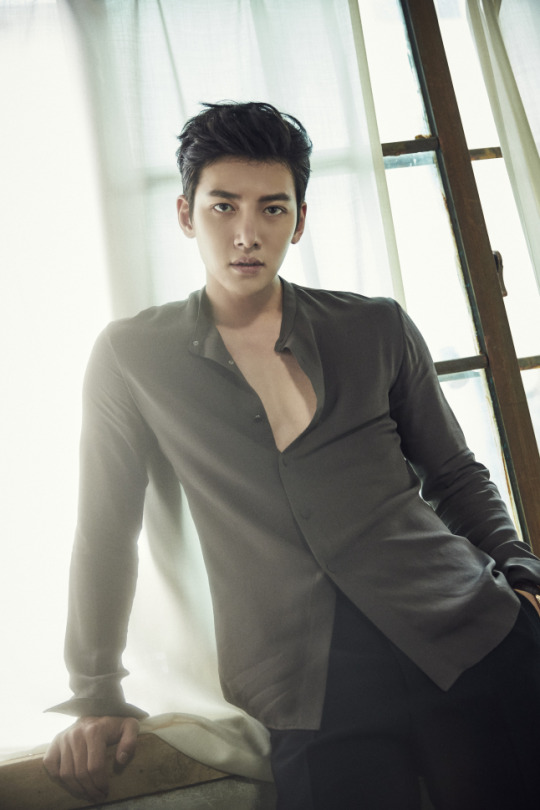
22. JAKE HSU as MENG SHAO FEI - Yet another show that I got sucked into by tumblr - and also one with a great, fun fandom through which I met lots of lovely people who I still follow/am mutuals with to this day. I just *adored* Jake’s character in History and I also loved the ship - Tang Fan and Meng Shaofei were awesome and adorable together and I was totally invested in both the ship and the gangster/cop/what happened years ago story happening alongside the ship. And Jake is just all kinds of cute.
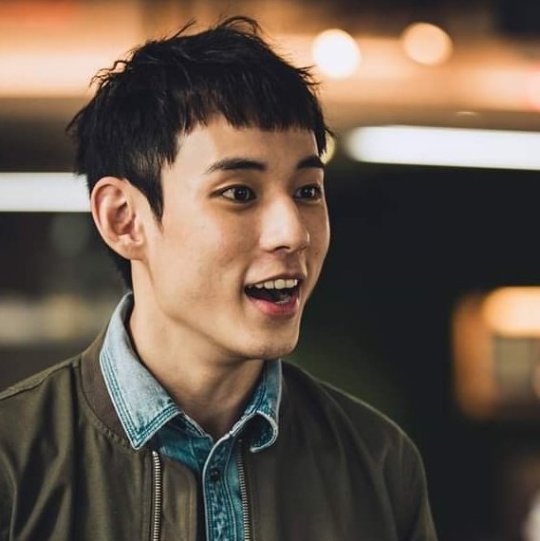
23. XIAO ZHAN - Aaaand we are pretty much up to current day now... where The Untamed took over my life in the summer of 2019 and has yet to let me go. Xiao Zhan is another disgustingly talented human being - a fantastic singer and a really good actor, and also an artist - and he also just comes across as a genuinely sweet and charming person, and a very thoughful and earnest one too. And lbr he is ridiculously pretty, and his smile is just pure sunshine.
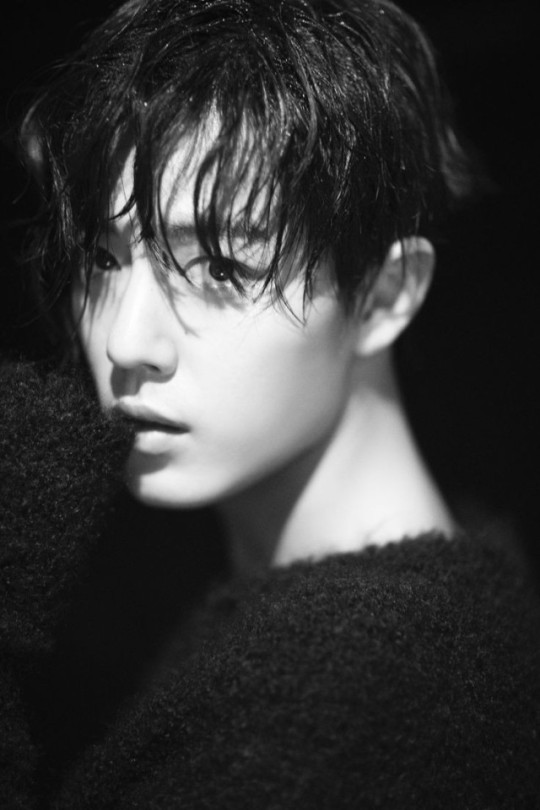
24. LEE DONG WOOK as LEE YEON - The most recent entry to the charts.... a Korean actor I was aware of but whose work I hadn’t watched and whose looks didn’t particularly seem to grab me... until I watched Tale of the Nine Tailed and fell head over heels for Lee Yeon (and daaayum does red hair suit LDW!!) and very quickly began to find LDW’s looks very appealing (and oh my, does Lee Yeon whump well!!). And yes, I have now started watching Goblin. :D
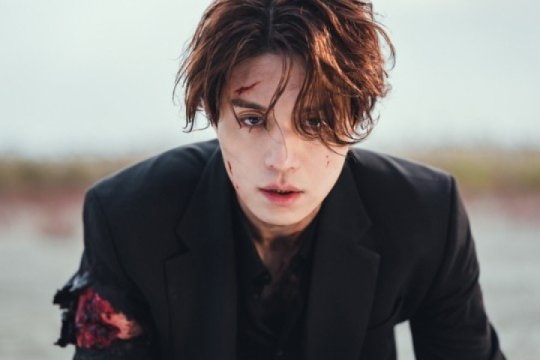
Phew! Aaaand we are done! I’ll admit, I did think of a few more as I was compiling this list but I decided to categorise them as more “minor” crushes and not include them... otherwise we really could be here all day!!
I’m going to tag: @sarah-yyy, @arlothia, @howdydowdy, @thepromiseweheldforlife and @the-wandering-whumper!
10 notes
·
View notes
Text
2017 Year in Review

This past year was, to put it mildly, rather tumultuous. For every high point of the year, there seemed to be low points all around it. But now the year has ended, and hopefully, this next one brings more good and a hell of a lot less bad than its predecessor. However, as said; 2017 wasn't all bad, and this is what I've decided to write about today. Finding myself inspired by the myriad of posts about people's top five or ten games, movies, shows, and so on, I've decided to continue that trend and catalogue the media I found to be exceptional, the media that helped me through the ups and downs of these twelve long months we just experienced. Some I may have written about before, and some will be new, but all of them deserve praise and recognition abound...at least, in my opinion. So without further ado; here are my most enjoyed pieces of media I experienced in 2017.
We'll start this article off by discussing a category I haven't really discussed on this blog before - music. The reason I don't usually write about music is due to how disparate my preferences can be for this particular media medium. Some days, I'm all about hard and the heavy, while others I'll dip into instrumentals, jazz, or video game soundtracks. Hence, the music I'll be listing here won't have much of a comparable flow - I just thought it was all pretty good.
This first album ties into one of my favorite games from 2017, easily a contender for my choice for Game of the Year; the soundtrack to the superb indie game Night in the Woods, as orchestrated by Alec Holowka. The soundtrack is beautifully mellow, pleasantly tuned for ambiance. In the game, the music accentuates and emphasizes all of the game's themes, emotional depth, and down-to-earth feel. Out of the game, the soundtrack is perfect for chilling out, studying, writing, or any such easy-going activity. I frequently found myself playing it in the background whilst reading or doing the few articles I wrote, or using it to relax after a particularly trying moment. Continuing the theme of game soundtracks, another that caught my fancy was the Persona 5 OST, composed by Shoji Meguro. An eclectic mashup of genres, the soundtrack bounces between somber piano, energized guitar, and jazz compositions, with a handful of excellent vocal tracks thrown in for good measure. This album is great for a variety of moods or activities thanks to the numerous tones and tempos the music flows between. And with nearly four hours worth of music to sift through, it stands to reason you'll be able to find something you like.
Moving from video game music, another album I found myself enjoying through the year was Alestorm's No Grave but the Sea. If you're unfamiliar with Alestorm, they fill a rather particular music niche; Pirate Metal, a fusion of piratical slang and heavy metal. Alestorm further accentuates their distinct sound with frequent usage of brass and string instruments, as well as a synthesized accordion. I found myself intrigued by their music several years ago when the band released the album Back through Time, and have followed them since. No grave but the Sea is relatively short, coming in at under an hour across its ten tracks. If you're a fan of niche genres, or just a metal fan looking for something new, I'd recommend you give it a listen. Closing out the music section is Linkin Park's One More Light. OML released only a few weeks after Alestorm's No Grave but the Sea but usurped it in my music library almost instantly for a brief time before the unfortunate suicide of Chester Bennington. In fact, I would call One more Light one of Linkin Park's best albums, despite it being the starkest departure from the band's hard rock sound to date. That isn't to say the album isn't heavy, though. One More Light is heavy in tone, as opposed to sound; If you want an example, listen to the premier single "Heavy" or the titular "One More Light", and you'll get a firm grasp on how the album feels. One more Light clocks in at a short but sweet thirty-five minutes, and I would wholeheartedly recommend taking the time to sit down and listen to it in full.
TV shows take the second slot, though I'll be honest; I definitely don't watch a lot of television. Not live, anyway. Most of what I watch is through streaming services, so a few of these aren't technically from 2017, at least not in full. But since I first watched these shows in 2017 it counts. Without further ado, here are my favorite television shows I started or finished in 2017.
Kicking off the television roster is Twin Peaks. If you're unfamiliar with the show, Twin Peaks was written and directed by David Lynch. It stars Kyle MacLachlan as the charming and amusing Special Agent Dale Cooper, a federal investigator sent to the enigmatic small town of Twin Peaks to solve the murder of local sweetheart Laura Palmer. Not much can be said about the plot of this show without spoiling it or just plain confusing somebody, but suffice it to say that all they appear to be. Everybody has a secret, and the show doesn't take too long to spiral into the surreal in typical Lynchian fashion. Twin Peaks initially debuted in 1990, earning two seasons and a cult following that lasted the 26-year gap until its third season released in 2017. Long story short; the show is great - It has intrigue, comedy, a wide cast of interesting characters, and a story that will keep you guessing until the end and beyond. The show isn't without its faults and can be flat out baffling at times, but despite all of that the show and its story is a fantastic experience to behold.
The next show on my list both compliments and contrasts Twin Peaks; Broadchurch. Broadchurch is a crime serial taking place in the fictional (and titular) town of Broadchurch, starring David Tennant as Detective Inspector Alec Hardy, and Olivia Colman co-stars as Detective Sergeant Ellie Miller. The series kicks off by investigating the murder of local youth Daniel Latimer, before moving on through its three-season run to investigate another murder case and finally a sexual assault, all the while weaving a compelling tale of a small town trying to cope with and move on from these horrible crimes. Broadchurch is a heavy experience, with very little levity to break up the tension of each investigation. That being said, It's still an excellent show with a genuinely compelling narrative backed up by the top-notch acting of the cast.
Setting aside the crime drama, we come to the next show - Voltron: Legendary Defender. Technically, the series' first season debuted in 2016, but 2017 saw the release of the second, third, and fourth seasons, meaning it was a pretty Voltron filled year. Legendary Defender is the latest in the long line of Voltron adaptations, following the Paladins of Voltron as they fight to defend the galaxy from the evil Galra Empire. Now I've never watched any of the other Voltron shows, so I can't speak for their quality (or lack thereof). As far as first impressions to a series go, Legendary Defender couldn't be better. Helmed by DreamWorks and Netflix, and written by the creative minds behind Avatar the last Airbender and its sequel Legend of Korra, Legendary Defender was probably the best-animated show I watched all year. In terms of quality, the show is top notch. Excellent voice acting, great animation, and a fun but serious story that has me eagerly anticipating wherever it goes in 2018.
Wrapping up this section are the many, many Netflix Marvel series. This includes Daredevil, Jessica Jones, Luke Cage, Iron Fist, The Defenders, and finally The Punisher. I had already seen some of these before but went in for a rewatch in preparation for all the new stuff coming out in 2017. If you're not familiar with these shows, however unlikely that is, I'll summarize each show in a sentence or two. Daredevil follows Matthew Murdoch who, after losing his sight but gaining superhuman senses as a child, fights crime in hell's kitchen on two fronts; as a lawyer, and as the vigilante Daredevil. Jessica Jones follows former street hero turned private-eye, Jessica Jones, as she tries to deal with the aftermath of a traumatic incident in her past while an old foe comes back to haunt her. Luke Cage follows Ex-Con and titular character Luke Cage as he tries to clean up the streets of Harlem and free it from corruption. Iron Fist follows Danny Rand, boy billionaire and sworn defender of Kun Lun as he tries to combat a mysterious organization known as The Hand. The Defenders finally unites these four heroes for the first time, as they all come together to battle the aforementioned Hand in an attempt to stop them once and for all. Finally, we come to The Punisher, which follows war veteran turned vigilante Frank Castle as he hunts the people responsible for the murder of his wife and children. I won't go into an extended review here, so to keep it simple; Daredevil is amazing (though its second season has some flaws), Jessica Jones is great, Luke Cage is great, Iron Fist is fine, The Defenders is amazing, and the Punisher is fantastic...to summarize, pretty much all of these shows are worth a watch.
Now, as I said at the beginning of this article, 2017 was a pretty shaky year. A lot of ups, and a lot of downs. Many of these ups, at least for me, are in the next category; 2017 was a pretty great year for movies, in my opinion. It was a busy year for movies, but when isn't it? For every one movie I watched, there were three more I had to wait on, but pretty much every film I watched in 2017 knocked it out of the park. From comic book films to horror flicks, each one of these movies takes the cake.
The premier movie for this article is Get Out, one of the contenders for my favorite movies of the year. Helmed by Jordan Peele, Get Out is a genuinely uncomfortable horror/thriller about a black boyfriend meeting the family of his white girlfriend. It tells a heavy but undeniably compelling story, one that keeps you guessing and inspires a fair amount of thought after the fact. I won't go into too much here, but I will say that if you haven't seen this movie, you absolutely should. Speaking of movies that make you think, Bright is up next, the new racially-conscious Netflix movie starring will smith and....no, not really. Actually, The Lego Batman Movie is up next; a goofy, charming, and stark contrast to all of the gritty DC movies that have been churned out over the past few years. This movie was genuinely funny and felt fun to watch...something that can't be said about some of the more recent DC films. I've written about this movie before, and my thoughts today still echo that review; This was one of the best Batman movies I've seen. Following The Lego Batman Movie, the next film on my list is John Wick: Chapter 2. There's not much to say about this movie other than the fact that it's a top-notch sequel that keeps all of the pros of its predecessor, and in some cases, improves on them. It isn't a terribly different story than its predecessor; Somebody messes with John Wick, so John Wick messes back by going on a vengeance-fueled spree. It's an action-filled thrill ride that doesn't disappoint.
Another action-filled thrill ride takes the form of Logan, and....wow. Logan is another contender for my favorite film of the year. The movie serves as equal parts finale for both Patrick Stewart and Hugh Jackman as Charles Xavier and Wolverine respectively, and it does so perfectly. Logan is a shining example of what Comic Book films should aspire to, with an outstanding script, Oscar-worthy acting, and a top-notch story to close out this era of the X-Men cinematic universe. Finally, we come to one of the last movies released in 2017; Star Wars The Last Jedi. I'm sure if you're reading this, you've probably seen this movie. Maybe you liked it, Maybe not. I, however, thought this movie was pretty damn good. One of the better Star Wars films, I think Rian Johnson did well at what he set out to do. I won't say it's the best movie of the year, but it makes my list of favorites.
Finally, we come to the last section of this year in review: Video Games. I actually got to play a fair few of these this year and liked basically all of them. But, this isn't "Year in Review, things I thought were passable". This is "Year in Review, my favorites", and so what follows are my favorite games of 2017. From AAA titles to simple indie games, each one of these had the right amount of fun, charm, and entertainment to keep me hooked and keep me coming back to them time and again.
We'll kick this list off with a game that embodies charming simplicity; Slime Rancher. This game debuted back in 2016 as an early access title but finally released in an official capacity in August of 2017. I didn't think much of it when it came out, just grabbed it since it was free through Xbox Live's games with gold program. Color me surprised, then, when it turned out to be one of my favorite games of the year. I previously wrote about this so you can see my full review here, but what I'll say here is that Slime Rancher is a surefire recommendation on my part. The next two games are anything but simple, at least in terms of story; Kingdom Hearts 1.5 and 2.5 HD (PS4). I had played these games before, on the PS2 and PS3, but what can I say? Kingdom Hearts is one of my favorite gaming franchises out there, and the ability to play it again on modern consoles was a treat. With the release of Kingdom Hearts III on the horizon (hopefully), going back to experience the franchise in full was a fantastic refresher. If you've never played Kingdom Hearts before, getting the modern gen remasters is your best way to experience these games right now.
Following Kingdom Hearts is Persona 5, one of two games I would strongly consider as Game of the Year. I had never played a persona game before this, at least not in full, and this game almost made me regret that. Persona 5 is near perfect, with a great story, smooth and snappy gameplay, and a top-notch aesthetic balanced between its visuals and its sound design. Atlus has a history of making quality games, and Persona 5 is no exception. Continuing from there, we come to Night in the Woods, the second of my two Game of the Year contenders. In fact, were it not for Persona 5, Night in the woods would be the winner for 2017, at least in my book. This is another game I've written about in full and I would recommend reading that review here because I had a fair amount to say. Night in the Woods saw two releases in 2017, once at the start of the year, and once at the end of it. Because of this, the game both kicked off and closed down my 2017 year, and I couldn't have asked for a better game to do so.
That about wraps up my Year in Review. 2017 was a full year for media, and I have a lot to catch up on, but luckily I was able to experience just about as much as I missed. Not everything I did this year appeared in this review, but these were the things that elevated themselves above the competition and took the titles of favorites for 2017. I extend my thanks to anybody who stuck with this blog, or even read just one of my articles in the last year, and hope that the new year is kind to all of you. This year promises to be just as good, if not better for media purposes, so I eagerly await whatever comes next. Here's to a great 2018, folks.
2 notes
·
View notes
Photo
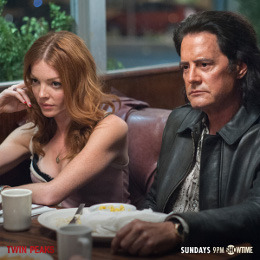
#TwinPeaks: Kyle MacLachlan on creating doppelgängers and Dirty Cooper
In the original Twin Peaks, Kyle MacLachlan was Agent Cooper, one of the great heroes in TV history. On the new Twin Peaks, the star plays multiple Coopers, but none of them are yet the Agent Cooper we know. He’s Cooper’s disembodied spirit. He’s Cooper’s evil doppelgänger, driven by a ruthless desire to survive. He’s Cooper’s evil doppelgänger’s dim-witted, adulterous, everyman double (now deceased). He’s a reincarnated Cooper but sapped of mind, memory, and much personality (though blessed with incredible gambling luck). It’s like co-creators David Lynch and Mark Frost have teamed with their actor to turn Agent Cooper into an art project: the loss of heroic goodness and the flourishing of anti-hero on TV.
That’s just my theory. MacLachlan himself is just having fun. The actor, 58, says the new Twin Peaks presented him with a challenge that was nerve-wracking and thrilling, and he delighted in the creativity of making it work for his longtime friend, Lynch, who directed him in Dune and Blue Velvet. He tells us we haven’t really seen anything yet from Twin Peaks, although, of course, he’s sworn to keep the details secret. “It’s David Lynch,” he says, “and he’s taking you to a place that he wants to go. It’s in his mind, we’re going on this journey with him, so buckle up, here we go!”
We caught up with MacLachlan for coffee and a brief chat about creating his multiple Coopers before he left for France to bring Twin Peaks to the Cannes Film Festival.
ENTERTAINMENT WEEKLY: Are you pleased with the response so far to the show?
KYLE MACLACHLAN: I am. I thought the reviews were acknowledging that they were seeing something unusual and very difficult to judge because it’s a small portion of what is clearly a longer journey. At the end, there will be a lot of things written, I can imagine, about the experience, whether it was fulfilling or not. But right now, it seems like the reaction we’re getting is, if this is your cup of tea, it’s a pretty great journey to take.
Did you watch the premiere when it aired?
I didn’t. I had seen the first two when they were screened at the Hollywood premiere, and the impact on me was pretty profound. So I’m sitting in that before I go back and revisit it again because I know my second time through, I’ll become very critical. I think that’s part of the process. Unlike so many other things on television – and this is not a criticism, it’s just the way it is – this is something that you really need to sit with, I think. It resonates and it continues to resonate if you let it.
What did you make of Cooper’s dark doppelgänger when you first
encountered him in the script or when David and Mark told you about him?
I felt challenged, immediately. When we met initially, David said, “We’re doing Twin Peaks, I need Cooper, are you in?” And I said yes — that’s a no-brainer — and then he said, “Well, there will be a few other things, too,” and he didn’t go into great detail about the “other things” that I would be doing that I can remember. But when I read it, I went, “Oh, wow, okay.” I was nervous, but I was — and am — also incredibly humbled that David would give me this opportunity to play a character that is so unlike me and anything I’ve done, that he believes in my ability enough to trust me to do it. Because he’s got no choice! He’s got me! I’m Cooper! But that he has the trust that it would work meant a lot. I still didn’t know if it would work until I saw it the other night. I mean, I remember the filming of it, I remember feeling pretty good about it, but to actually see it, and see if it was successful, I was really pleased.
How did you construct the look and tone of this Dirty Cooper?
I remember in the early stages, I said to David, initially out of my own insecurity, that I thought one thing that would help would be black contacts for the eyes. I had seen it done before, used to make it feel like there was an entity in there, behind the eyes. I ran it by him. I half expected him to say no, we don’t need that, but he said that might be good. So we tried a variety of contacts, from very dark to not so much and different styles. I kept asking David, “Is this taking you out of the process, is it taking you out of the journey of this character?” And he said no, it’s working great. It looks like there’s a darkness there, but you’re not completely sure. Everything about him is dark. My skin is mottled, my hair is greasy and kind of long. You know how Javier Bardem did it in No Country for Old Men, where he had that very specific look, where he was almost angelic, but in a demonic kind of way? We wanted something that was like that, but not too over the top. No long scraggily hair, for example. This is kind of coiffed in an awkward way. That was an important part of the look, as well. We found all these elements separately and it worked. It was a great process. I don’t usually get to do that.
And obviously, we’re supposed to be getting a hint of demon BOB in there, right?
Oh, yeah. Yeah.
How about the wardrobe, the shirt and jacket?
That was David. We tried a few different ones before we found the one we really liked. We went through some jewelry options that were all discarded and rightfully so. Simple is always better. It’s always about finding the character without cluttering the character. In my mind, you want to put in just enough salt. You want to come up from underneath him and stop just when you find him and not go any further. Knowing when to stop is really important.
You also lower your voice, and while we get intensity, even interest in the game of staying alive and in the world, you don’t play his evil with much joy for it.
Yes, I thought there should be gravity there, there should be stillness there. Rhythmically, he should be different, different on so many levels. I tend to be a little more animated in real life and when I work, and Cooper is certainly animated in life and my work. This guy doesn’t have any of that. He is there to be served.
How do you conceptualize a character like this in your head? Do you think of him as a human being? A demon? An idea?
He’s a shark. There’s no remorse, there’s no happiness, there’s that quality when the shark is feeding and relishing it, the frenzy — the inhaling of someone’s soul — that’s him. He, for me, was real, insofar as being a living thing. But it was more about playing his force, his energy, his will. Those were the things that I hung onto, as opposed to making him real. He goes to places I haven’t been much as an actor. There was a thing I did several years ago called Where the Day Takes You (1992), where I was a drug dealer. This character is kind of in that direction, but it was a long, long time ago, so this was a new place for me to go. Thank god it did. I remember thinking, if I’m going to go someplace new, who better to take me there as a director than David? Because I know I am going to be completely protected and cared for. And that’s great for me as an actor I don’t have to self-monitor.
I have a visceral reaction to scenes where characters throw up, so part 3 was something of a treat. Your Coopers threw up a lot in that hour. That must have been fun to do.
It was vile. Vile. Yeah, that was not the most comfortable sequence there. I was sort of overwhelmed by the amount! That’s all I can really say about that. It was vile and it was a lot.
What was it made of?
I know cream corn was part of it. But after that, I’m not sure what they used.
You also got to play another version of Cooper, Dougie Jones.
That was a fun little departure,. It was all about trying to capture in a few little moments, the awkwardness of that and the reality, of that guy, and the fun of it. He’s s screw-up, a lovable screw up. That was fun. It was very brief, just a day, maybe two days of filming.
The first two episodes and part of the third, Agent Cooper exists in these otherworldly, metaphysical spaces — high concept, very personal scenarios of David’s design. What’s it like as an actor to navigate those scenes when you’re performing them? And how much of those sets are built-out and how much of it do you have to imagine?
Some practical, some descriptive, but either way, always, I’m checking with David to get as much info as I can on the environment. What am I falling through? What is the texture? What could I possibly see? How overwhelmed or underwhelmed am I by the experience? That’s always a key concern for me. Always I’m trying to find the regulator, so I’m in the right state of mind for that moment.
What advice did he give you on how to move through the sequence that opens part 3, when Cooper finds himself in that space with the woman with sealed-up eyes?
What I have found in those situations is that most of the time the audience will do most of the work for you. So while David will tell me things like, “Look off the edge and watch her fall,” I don’t have to reflect back your reaction, to do the shock or the GASP!, because the audience will do that for you. What I’m doing as Cooper is to be in the moment with my wits about me, taking in everything, recognizing that I’m on an unusual, strange journey. I took the position that Cooper knows that this is going to be crazy, that something weird is going to happen, and he just needs to go with it. He’s going to need to have to use his wits to find his way through, the best way he can, but ultimately, he’s going in the right direction. That’s what I held onto. We filmed that sequence in all sorts of bits across time and I can’t wait to see how they all flow together.
What was it like to act with talking trees in the Red Room scenes?
I had no idea. It was an X on the curtain. The first time I saw the trees was when I saw it on screen at the premiere.Was there a description in the script?
No. it was just a voice. I don’t think there was even any dialogue. Yeah, that was odd.
Agent Cooper is back on Earth, but he’s not yet the Cooper we know. Can you describe a bit how you make sense of this Cooper?
This is a guy that is a child — not even a child, a baby, who has the focus and the capability of a baby. So if something is interesting to him, all his focus and attention is on that object for as long as it’s there or until something else gets his attention. Everything is new for this character. Just the exercise of it was fun, and finding the funny quirky moments, too. And to play with tempo — how long can you play something out? And that plays into one of the things that David is so brilliant at, which is rhythm. Rhythm and tempo. So it was just great playing in that space and style that he does.
There’s that moment in part 4 when Cooper takes the drink of coffee, and I thought maybe, in that moment, his mind would come rushing back.
Yeah, I thought that too. It’s going to be interesting to see how that tension plays out and how the audience responds to it. I was thinking about this and how people are responding to it right now — there is just so much more to come! Each time, each part, there’s going to be such new stuff. And people will go back and start to put the pieces together, they’ll start assembling this story. It’s unlike anything I’ve seen before on TV.New episodes of Twin Peaks air Sundays at 9 p.m. on Showtime.
link (TP)
34 notes
·
View notes
Link
Subscribe to A Twin Peaks Podcast: A Podcast About Twin Peaks – on iTunes, Stitcher, or wherever you get your podcasts – to unwrap the mysteries in EW’s after-show every Monday during the Showtime revival.
In the original Twin Peaks, Kyle MacLachlan was Agent Cooper, one of the great heroes in TV history. On the new Twin Peaks, the star plays multiple Coopers, but none of them are yet the Agent Cooper we know. He’s Cooper’s disembodied spirit. He’s Cooper’s evil doppelgänger, driven by a ruthless desire to survive. He’s Cooper’s evil doppelgänger’s dim-witted, adulterous, everyman double (now deceased). He’s a reincarnated Cooper but sapped of mind, memory, and much personality (though blessed with incredible gambling luck). It’s like co-creators David Lynch and Mark Frost have teamed with their actor to turn Agent Cooper into an art project: the loss of heroic goodness and the flourishing of anti-hero on TV.
That’s just my theory. MacLachlan himself is just having fun. The actor, 58, says the new Twin Peaks presented him with a challenge that was nerve-wracking and thrilling, and he delighted in the creativity of making it work for his longtime friend, Lynch, who directed him in Dune and Blue Velvet. He tells us we haven’t really seen anything yet from Twin Peaks, although, of course, he’s sworn to keep the details secret. “It’s David Lynch,” he says, “and he’s taking you to a place that he wants to go. It’s in his mind, we’re going on this journey with him, so buckle up, here we go!”
We caught up with MacLachlan for coffee and a brief chat about creating his multiple Coopers before he left for France to bring Twin Peaks to the Cannes Film Festival.
ENTERTAINMENT WEEKLY: Are you pleased with the response so far to the show?
KYLE MACLACHLAN: I am. I thought the reviews were acknowledging that they were seeing something unusual and very difficult to judge because it’s a small portion of what is clearly a longer journey. At the end, there will be a lot of things written, I can imagine, about the experience, whether it was fulfilling or not. But right now, it seems like the reaction we’re getting is, if this is your cup of tea, it’s a pretty great journey to take.
Did you watch the premiere when it aired?
I didn’t. I had seen the first two when they were screened at the Hollywood premiere, and the impact on me was pretty profound. So I’m sitting in that before I go back and revisit it again because I know my second time through, I’ll become very critical. I think that’s part of the process. Unlike so many other things on television – and this is not a criticism, it’s just the way it is – this is something that you really need to sit with, I think. It resonates and it continues to resonate if you let it.
What did you make of Cooper’s dark doppelgänger when you first encountered him in the script or when David and Mark told you about him?
I felt challenged, immediately. When we met initially, David said, “We’re doing Twin Peaks, I need Cooper, are you in?” And I said yes — that’s a no-brainer — and then he said, “Well, there will be a few other things, too,” and he didn’t go into great detail about the “other things” that I would be doing that I can remember. But when I read it, I went, “Oh, wow, okay.” I was nervous, but I was — and am — also incredibly humbled that David would give me this opportunity to play a character that is so unlike me and anything I’ve done, that he believes in my ability enough to trust me to do it. Because he’s got no choice! He’s got me! I’m Cooper! But that he has the trust that it would work meant a lot. I still didn’t know if it would work until I saw it the other night. I mean, I remember the filming of it, I remember feeling pretty good about it, but to actually see it, and see if it was successful, I was really pleased.
How did you construct the look and tone of this Dirty Cooper?
I remember in the early stages, I said to David, initially out of my own insecurity, that I thought one thing that would help would be black contacts for the eyes. I had seen it done before, used to make it feel like there was an entity in there, behind the eyes. I ran it by him. I half expected him to say no, we don’t need that, but he said that might be good. So we tried a variety of contacts, from very dark to not so much and different styles. I kept asking David, “Is this taking you out of the process, is it taking you out of the journey of this character?” And he said no, it’s working great. It looks like there’s a darkness there, but you’re not completely sure. Everything about him is dark. My skin is mottled, my hair is greasy and kind of long. You know how Javier Bardem did it in No Country for Old Men, where he had that very specific look, where he was almost angelic, but in a demonic kind of way? We wanted something that was like that, but not too over the top. No long scraggily hair, for example. This is kind of coiffed in an awkward way. That was an important part of the look, as well. We found all these elements separately and it worked. It was a great process. I don’t usually get to do that.
And obviously, we’re supposed to be getting a hint of demon BOB in there, right?
Oh, yeah. Yeah.
How about the wardrobe, the shirt and jacket?
That was David. We tried a few different ones before we found the one we really liked. We went through some jewelry options that were all discarded and rightfully so. Simple is always better. It’s always about finding the character without cluttering the character. In my mind, you want to put in just enough salt. You want to come up from underneath him and stop just when you find him and not go any further. Knowing when to stop is really important.
You also lower your voice, and while we get intensity, even interest in the game of staying alive and in the world, you don’t play his evil with much joy for it.
Yes, I thought there should be gravity there, there should be stillness there. Rhythmically, he should be different, different on so many levels. I tend to be a little more animated in real life and when I work, and Cooper is certainly animated in life and my work. This guy doesn’t have any of that. He is there to be served.
How do you conceptualize a character like this in your head? Do you think of him as a human being? A demon? An idea?
He’s a shark. There’s no remorse, there’s no happiness, there’s that quality when the shark is feeding and relishing it, the frenzy — the inhaling of someone’s soul — that’s him. He, for me, was real, insofar as being a living thing. But it was more about playing his force, his energy, his will. Those were the things that I hung onto, as opposed to making him real. He goes to places I haven’t been much as an actor. There was a thing I did several years ago called Where the Day Takes You (1992), where I was a drug dealer. This character is kind of in that direction, but it was a long, long time ago, so this was a new place for me to go. Thank god it did. I remember thinking, if I’m going to go someplace new, who better to take me there as a director than David? Because I know I am going to be completely protected and cared for. And that’s great for me as an actor I don’t have to self-monitor.
I have a visceral reaction to scenes where characters throw up, so part 3 was something of a treat. Your Coopers threw up a lot in that hour. That must have been fun to do.
It was vile. Vile. Yeah, that was not the most comfortable sequence there. I was sort of overwhelmed by the amount! That’s all I can really say about that. It was vile and it was a lot.
What was it made of?
I know cream corn was part of it. But after that, I’m not sure what they used.
You also got to play another version of Cooper, Dougie Jones.
That was a fun little departure,. It was all about trying to capture in a few little moments, the awkwardness of that and the reality, of that guy, and the fun of it. He’s s screw-up, a lovable screw up. That was fun. It was very brief, just a day, maybe two days of filming.
The first two episodes and part of the third, Agent Cooper exists in these otherworldly, metaphysical spaces — high concept, very personal scenarios of David’s design. What’s it like as an actor to navigate those scenes when you’re performing them? And how much of those sets are built-out and how much of it do you have to imagine?
Some practical, some descriptive, but either way, always, I’m checking with David to get as much info as I can on the environment. What am I falling through? What is the texture? What could I possibly see? How overwhelmed or underwhelmed am I by the experience? That’s always a key concern for me. Always I’m trying to find the regulator, so I’m in the right state of mind for that moment.
What advice did he give you on how to move through the sequence that opens part 3, when Cooper finds himself in that space with the woman with sealed-up eyes?
What I have found in those situations is that most of the time the audience will do most of the work for you. So while David will tell me things like, “Look off the edge and watch her fall,” I don’t have to reflect back your reaction, to do the shock or the GASP!, because the audience will do that for you. What I’m doing as Cooper is to be in the moment with my wits about me, taking in everything, recognizing that I’m on an unusual, strange journey. I took the position that Cooper knows that this is going to be crazy, that something weird is going to happen, and he just needs to go with it. He’s going to need to have to use his wits to find his way through, the best way he can, but ultimately, he’s going in the right direction. That’s what I held onto. We filmed that sequence in all sorts of bits across time and I can’t wait to see how they all flow together.
What was it like to act with talking trees in the Red Room scenes?
I had no idea. It was an X on the curtain. The first time I saw the trees was when I saw it on screen at the premiere.
Was there a description in the script?
No. it was just a voice. I don’t think there was even any dialogue. Yeah, that was odd.
Watch the cast discuss the show’s odd universe and the revival in the new People/Entertainment Weekly Network (PEN) special EW Reunites: Twin Peaks here, or download the app on your favorite mobile and streaming devices.
Agent Cooper is back on Earth, but he’s not yet the Cooper we know. Can you describe a bit how you make sense of this Cooper?
This is a guy that is a child — not even a child, a baby, who has the focus and the capability of a baby. So if something is interesting to him, all his focus and attention is on that object for as long as it’s there or until something else gets his attention. Everything is new for this character. Just the exercise of it was fun, and finding the funny quirky moments, too. And to play with tempo — how long can you play something out? And that plays into one of the things that David is so brilliant at, which is rhythm. Rhythm and tempo. So it was just great playing in that space and style that he does.
There’s that moment in part 4 when Cooper takes the drink of coffee, and I thought maybe, in that moment, his mind would come rushing back.
Yeah, I thought that too. It’s going to be interesting to see how that tension plays out and how the audience responds to it. I was thinking about this and how people are responding to it right now — there is just so much more to come! Each time, each part, there’s going to be such new stuff. And people will go back and start to put the pieces together, they’ll start assembling this story. It’s unlike anything I’ve seen before on TV.
New episodes of Twin Peaks air Sundays at 9 p.m. on Showtime.
29 May 2017 | 4:18 pm
Jeff Jensen
Source : EW.com
>>>Click Here To View Original Press Release>>>
(adsbygoogle = window.adsbygoogle || []).push({});
May 29, 2017 at 10:48PM
0 notes
Photo
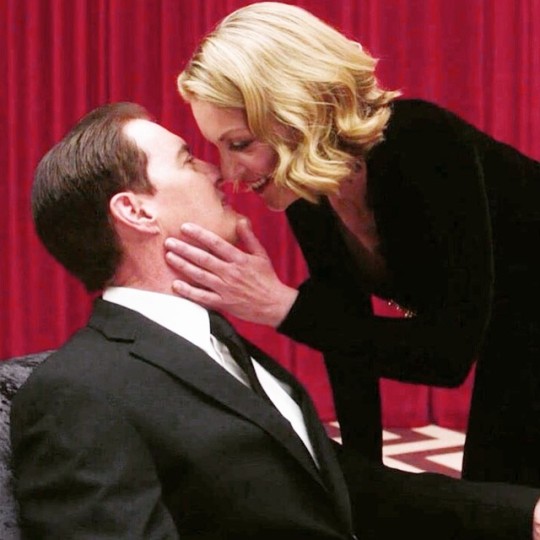
#TwinPeaks Sheryl Lee Explains What It Feels Like to Be in the Red Room
By Devon Ivie
“You can go out now.”
A quarter of a century after warning Agent Dale Cooper (Kyle MacLachlan) that she’ll see him again in 25 years — nice timing, Showtime — Laura Palmer (Sheryl Lee) returned to the Red Room in the second episode of Twin Peaks: The Return to give him permission to finally leave. It’s a smoldering, surrealist scene that will undoubtedly make fans of the original series squeal with joy, which culminates with Laura whispering yet another secret into Agent Cooper’s ear before flying off into an oblivion of curtains. We’ve missed you and your screaming, girl! Earlier this week, we spoke to Lee about coming back to the show, smooching MacLachlan, and why searching for the show’s true meaning is pretty pointless.
It must be pretty exciting to be able to talk about your return to the show now.
What I’m enjoying more is being able to see what David’s been working on. I’m a fan of his and of all of the other actors on the show, and I hadn’t seen anything until the rest of the world saw it. Well, we had the premiere two days before, but that was the first time I’d seen anything. So that, to me, is the most exciting part. As a fan myself, to get to see what magic he’s created this time around.
How did David let you know that the show would be returning? When I talked to Angelo Badalamenti last year, he said David actually came to his house to give him the good news.
Not like that. I had heard rumors for a long time, so I didn’t pay much attention to them. And then this time around I started hearing some rumors again, and they seemed to keep staying, and then I heard something from a cast member. I then either sent David an email or heard pretty quickly after that it was true. I don’t remember exactly how it went down. I believe it was first an email exchange of “yes, it’s true, more to come” or something like that. Don’t quote me on that because I can’t remember exactly!
Can you walk me through what was going through your mind during the very first take when you walked into the Red Room, being back together with Kyle once again?
You know, the thing is because of the focus it takes to work in the Red Room, it keeps me so present and in the present moment, that yes, there’s a little bit of surrealness. In one way it seems no time has passed, and in another way it seems as if lifetimes have passed. Especially in that Red Room, it kind of does that to you. [Laughs.] Of course working with Kyle is always a wonderful delight. I’m such a fan of his work, he’s absolutely brilliant. So it was wonderful to get to see him again. What I had to do in that scene required so much focus that it didn’t allow for a lot of space in my brain to go back to the way it was before. I had to stay very present and focused on what I was doing now, if you know what I mean. I don’t know what I’m allowed to talk about and what I’m not allowed to talk about! So I’m just going to say when you work in the Red Room you don’t work in the way you normally work, like if you’re not in the Red Room. It’s not scary, it’s just different, and has its own set of wonderful, creative challenges.
Does that relate to the mechanics behind your backwards-talking, as well?
Honestly, I don’t know if I’m allowed to answer that, either. So I’m going to have to leave my answer with “when you work in the Red Room, you work in a different way than when you’re not working in the Red Room.”
What direction did David give you when you were actually filming your scene? The acting on the show is so specific to Lynch’s world, I’m curious what his directives are.
It completely depends on what scene you’re in. He’s a master at creating an environment where you really get to stretch creatively and go to places that you maybe wouldn’t normally get to go to, and he created an environment that feels safe enough to do that. And at the same time he has a very, very clear vision of what he wants. So he’s able to give very specific directions about that.
During Laura and Cooper’s conversation about why she’s still in the Red Room, Laura says that “I am dead, yet I live.” How did you interpret this?
You’ll see how I interpret it if you keep watching the show. [Laughs.] That will be revealed.
You also have some slightly more CGI-heavy moments compared to the series’ initial run, like taking your face off.
I had to have quite a bit of that before working with David, so nothing about those particular moments felt like it was the first time. I didn’t take my face off necessarily, but I did have other moments that felt very surreal in that way, or that they went out of our everyday interpretation of what reality is or what reality looks like. For me, I know that’s part of the wonderful creative experience of working with him, that you get to explore these other aspects of life, not just the physical plane of existence that we see with our eyes.
Did you lose your voice from doing so many scream takes?
I’ve had to scream so many times for David, haven’t I? I learned 30 years ago how to take care of my voice on those days, thankfully, and to scream in the right way.
What was like to make women across the world jealous by kissing Kyle?
[Laughs.] I don’t think of it that way. To me, he’s this great guy that I get to work with. For me, the joy is in getting to work with him, and I don’t think, Oh I get to kiss him, I think, Oh, I get to work with him. He’s a true gentleman. A true gentleman. That’s greatly appreciated in this day in age. And when you see it, you appreciate it so much.
What does it mean to you that the show is back and thriving after 25 years?
Getting to work with all of those people, like David and [co-creator] Mark Frost, and creatively being able to to be challenged and grow — and to work with all of those artists in every department, it’s such an incredible group of artists. From the cinematographer to the sound to the editing to the art department, the actors, the writing. It’s all so delightful to dive back into the world and see everybody again. We’ve known each other for 30 years, a lot of us. It’s certainly a relief that it’s being well-received, too.
I was going to try to sneak a question about if we’ll see Laura again later this season, but I’ve been shut down so many times about plot-based questions.
[Laughs.] It’s not even like I know! I’m watching it with you guys. I can’t wait to see what happens on Sunday. It’s like a dream world, it’s not meant to be dissected.
And I really appreciate that. I feel showrunners are always obligated to do requisite post-episode interviews and such, and David’s clear reluctance to talk about anything in the narrative has been a nice breath of fresh air.
Yeah. Part of what’s so fun is that when each one of us looks at a painting, we draw a different meaning from it based on the lens on which we see it. We don’t all listen to music the same way. We don’t hear the same thing in the song.
We all find different meaning, and not only do we each find different meaning individually, but we find different meaning at different times in our lives. I can reread a book now at 50 that I read at 25 and draw completely different meanings from it. And that’s a gift of art. That’s one of the gifts of it — there is room for all of these different interpretations, and then it ignites the viewer’s own creativity.
link (TP)
4 notes
·
View notes
Photo

How #TwinPeaks inspired #Lost and #TheLeftovers
Damon Lindelof tells EW why ‘The Leftovers’ would not be possible without David Lynch’s classic series
JEFF JENSEN@EWDOCJENSEN
Let us be first to remind you for the millionth time that Twin Peaks, the short-lived sensation created by David Lynch and Mark Frost, inspired much of the television that has obsessed us over the past 20 years. To name just a few that hold the cult classic’s peculiar dark spark: Chris Carter’s The X-Files, David Chase’s The Sopranos, Matthew Weiner’s Mad Men, Vince Gilligan’s Breaking Bad, Bryan Fuller’s Hannibal, Damon Lindelof’s The Leftovers, Sam Esmail’s Mr. Robot, and Donald Glover’s Atlanta. Since Twin Peaks also shaped modern TV tastes and watching — capturing the imagination for serialized mystery, supernatural fantasy, and cool irony; setting an early standard for internet-based conversation and theorizing — we can say Twin Peaks even influenced you. Especially if you’re a person of a certain age.
Of course, Twin Peaks doesn’t completely explain the vibrant state of TV. The radical transformation of the media business — the emergence of demo-driven networks that turned cult TV into a business plan — deserves more credit. There’s probably no X-Files without a network like Fox. There’s certainly no Buffy The Vampire Slayer without The WB. In his essential book The Revolution Was Televised, critic Alan Sepinwall identifies a critical turning point when TV went next level: 1997, when HBO, seeking to ramp up original programming, empowered the likes of Tom Fontana and David Chase — veteran scribes frustrated by the limits of broadcast TV — to pursue bolder vision with decidedly adult storytelling. The buzzy nerve of Oz and even more so The Sopranos spurred broadcast competitors to take more chances and basic cable to get into the game, and now, here we are, with “television” streaming out of every media orifice possible. That, kids, is from where TV babies come, in a terribly reductive nutshell.
Twin Peaks contains a version of this creation myth in its DNA, too. In 1989, ABC, looking for new hits, took a chance on a risky marriage with an avant-garde filmmaker (Lynch) and an accomplished TV writer (Frost) who wanted to make a splash by reinventing the prime-time soap with sophisticated edge and ostentatious quirkiness. Think of Twin Peaks as a kinky bridal dress: something old, something new, something borrowed, something Blue Velvet. The relationship didn’t last long. ABC ditched Twin Peaks after a year, the fast fade partly due to a broadcast network in flux that really had no clue how to manage Team Lynch or the wild, weird, FrankenGenre creature they had made. Yet can’t you see Twin Peaks thriving in today’s mediaverse? Maybe, say, on Showtime?
Mark Frost certainly could. In 2012, the Twin Peaks co-creator beheld the exciting things happening in TV and thought, I want to do that, too. He had the perfect creative vehicle for it, too, one with something TV networks love: a recognizable and marketable brand name. But he couldn’t do it alone. Wouldn’t dream of it, either. So Frost called Lynch and put forth a proposal: How about making more Twin Peaks?
Lynch had convinced himself over the years that there was no interest in Twin Peaks. “I felt that the thing had drifted away,” says Lynch, “so part of me kind of shut down about the possibility of going back.” He was wrong. Twin Peaks actually lingered like a ghost, and it was slowly gaining power. Twin Peaks was steeped in the creative fabric of television, as evidenced by many series. There were people who identified as Twin Peaks fans — cultists who could read about Twin Peaks forever and ever in books, websites, and fanzines like the legendary Wrapped In Plastic, plus many more who considered the show a generational marker. Twin Peaks was also starting to make new fans via DVD (the complete series wasn’t available on disc until 2007) and streaming services like Netflix.
Frost presented Lynch with several arguments for reviving Twin Peaks right here, right now. They had a story to tell — Twin Peaks ended with several unresolved cliffhangers — and their infamously bonkers series finale included a curious, memorable line that offered an irresistible hook. “I’ll see you again in 25 years,” the specter of Laura Palmer (Sheryl Lee) tells FBI agent Dale Cooper (Kyle MacLachlan). “Meanwhile…” And then she struck a pose and froze, as if a statue, or suddenly frozen in time. Frost — confident, ambitious, and maybe a little competitive — also argued that they had a chance to make some bold art, without compromise, in a new TV universe that allowed for greater creative freedom than existed 22 years earlier.
“What I saw was that the TV landscape had shifted dramatically and people were obviously hungry for storytelling that has broken out of the box over the last 10 years,” says Frost. “I felt it was time to take a kind of evolutionary leap forward and that we should be a part of that. David readily agreed. But we went in knowing we couldn’t just do what we did in the past — we’ve got to raise the bar. So that was our admonition to ourselves. This is a chance to keep pace with that evolving landscape, to contribute something new, to move the ball forward even more. And we had some unfinished business.”
And so it goes that the return of the show that inspired today’s TV was inspired by the products of its own legacy. Fun Fact! Lynch doesn’t watch much TV, but he cites Mad Men and Breaking Bad as two shows of recent times that he loved. Their hotly anticipated contribution to our Peak TV moment — an 18-hour limited series described by Lynch as an 18-part feature film — premieres on Showtime on May 21.
We recently asked several leading TV producers to share how Twin Peaks influenced them. Over the next couple weeks, we’ll be sharing with you EW’s conversations with them. We begin with Damon Lindelof, who co-created Lost with J.J. Abrams and The Leftovers with Tom Perrotta, now airing its final season on HBO.
Lindelof’s tale of Twin Peaks fandom takes us back to a time when TV watching was a family time activity, not a solitary, everyone-on-their-own-screen free-for-all. His very personal testimonial also shows how Twin Peaks was part of larger moment in which David Lynch was virtually atmospheric — beginning with his neo-noir masterpiece Blue Velvet in 1986 and including the hyper-pop nihilism of Wild at Heart, released at the apex of the Twin Peaks phenomenon — and saturated the public imagination. Here, Lindelof reveals how Twin Peaks influenced Lost, how Twin Peaks informed his approach to surrealism in The Leftovers, and how the legacy of Twin Peaks nearly cost Lost its legendary monster.
ENTERTAINMENT WEEKLY: When did you first watch Twin Peaks?
DAMON LINDELOF: When it first aired. I watched it at my dad’s place. It was on his radar; he was very excited about Twin Peaks because of David Lynch. We had seen Eraserhead together, and I had loved it, and I remember him saying, “The guy who made Eraserhead has a new TV show and I think it’s going to be very good.” So we watched the pilot together, and once it was over, we watched it again, because he had recorded it.
This evolved into a ritual. Because I was with my dad every other week, there were some weeks I would watch it by myself, but the weeks I was with him, we would watch two episodes: that week’s new episode and the previous week’s episode again on VHS. He would do live commentary and we began to formulate theories. This was my first experience, in the pre-internet era, of theorizing about TV.
So you liked Twin Peaks.
I loved Twin Peaks.
What did you love about it?
The mystery. The music. The pacing. It was also my first exposure to soap operas. There was just this complex web of affairs that was delicious. Within the first couple of episodes of Twin Peaks, you understood that James and Laura had been together, but James and Donna were actually sort of secretly in love with each other. Laura was also dating Bobby, but he was also seeing Shelly, but Shelly was two-timing her abusive husband, Leo, who also had something going on with Laura and was dealing drugs to Bobby. Meanwhile, Josie Packard is having a secret affair with Sheriff Truman, except she’s also involved with Benjamin Horne, who was married, but also having an affair with Pete’s wife and Josie’s rival, Catherine, and also apparently messed around with Laura. The sexual intrigue was bonkers! And for me, a kid, it was new and exciting, particularly as it related to Laura, this teenage girl who was mixed up in some really bad, traumatic, dark stuff. That was really interesting and felt very fresh at the time.
And then there Agent Cooper. What an amazing character. His entrance in that pilot is a classic TV moment. I loved his quirkiness. He had these obsessions with coffee and pastry. The fact that he seemed to really be enjoying having just a grand old time investigating Laura’s rather horrific murder was provocative and entertaining.
The show had this very distinctive sense of humor. Deadpan and odd. The Log Lady! People remember her as weird, but I just thought she was really funny. And Ben and Jerry Horne, the brothers, their names are funny because of the ice cream, of course, but that scene where those two guys are eating these huge sandwiches and relishing the sensual experience of eating those huge sandwiches — just the fundamental bizarreness of it was hilarious.
One other thing that I loved about Twin Peaks was that it was scary. Cooper’s dream at the end of the third episode, when he’s in the old age makeup and we see Laura and The Man From The Other Place talking backwards — that creeped me out. I slept with the lights on after that episode.
I go on and on like this, because one of the ways that Twin Peaks impacted me was that it showed me that a TV show can be so many things at once — funny, scary, strange, sexy, melodramatic. It was the definition of unique. I had never seen anything like it, before or since. And then — when did Wild at Heart come out?
August of 1990, between the first and second seasons of Twin Peaks.
I loved Wild at Heart. It was just so gonzo. Looking back on it, I can’t say I became a fan of David Lynch because of Twin Peaks. I was just a fan of Twin Peaks. But after Wild at Heart, I was just all the way in on Lynch. By the way, this is not to take anything away from Mark Frost, who is a big part of Twin Peaks. But again, my dad turned me on to the show particularly because of Lynch, and then with everything that followed, including Wild at Heart, it became about Lynch, and everything that came with him. The music! That Angelo Badalamenti score! I played the Twin Peaks soundtrack all the time when I was a junior in high school. I didn’t own many CDs — I had to buy them with my own money, and they were expensive — but I owned that one.
What did you make of the supernatural aspect? It became more important to the storytelling as the series progressed. We came to find out that Twin Peaks was a hotspot of uncanny and spectral activity because it was located near a portal into a mystical realm, not unlike the Hellmouth in Buffy the Vampire Slayer, or, of course, The Island on Lost. Did you enjoy that part of the show?
That was interesting to watch unfold. From the start, you had Cooper’s dreams and you had his fascination with Tibet and a kind of mysticism that he associated with Tibet. That scene in the third episode of season 1, where he’s winnowing down a list of suspects through an intuitive process that involves throwing rocks at a bottle — that was funny and quirky, but it also suggested the supernatural, and obviously, the show became more and more supernatural as it went on.
But I didn’t see it coming. As my father and I were theorizing about Laura Palmer’s murderer, a supernatural possibility was not part of our speculations! But then we move into season 2, and you get the introduction of The Giant, and you have Major Briggs revealing that he’s been monitoring extraterrestrial communications in episode 2. Here, the show is openly declaring that everything is up for grabs. And I do remember loving that and being very excited by that stuff. But I experienced it as an escalation. The show didn’t start supernatural. It became progressively so.
When the show declared this supernatural aspect in season 2, a lot of people I knew who loved the show bailed. They wanted a naturalistic explanation. It reminds me that 25 years ago, TV was rather cool toward sci-fi/fantasy, although it was about to warm up to it.
That want for a naturalistic explanation might have had something to do with the fact that Twin Peaks intersected with another trend of the time, serial killer pop. I don’t know exactly when The Silence of the Lambs came out, but my memory of it is that it came out before or during Twin Peaks. [The film version of The Silence of the Lambs starring Jodie Foster and Anthony Hopkins was released Feb. 14, 1991, during the middle of the second season of Twin Peaks. The novel by Thomas Harris was published in 1988.] When you watch the pilot of Twin Peaks, you immediately think it’s a serial killer story because of the clues and how they’re found, like when Agent Cooper knows how to examine Laura Palmer’s fingernails and look for these pieces of paper the killer has been leaving behind with his victims. So I can understand why an audience expected a naturalist resolution, because serial killer stories resolve naturalistically.
How did you feel about the way Twin Peaks ended?
During the second season, I remember feeling at times, “This is not the show I fell in love with.” And then something would happen that would make me fall in love with it all over again. There was a storyline where Donna resumes Laura’s Meals on Wheels job and she comes into contact with this weirdo who grows orchids and is in possession of Laura’s secret diary. And I remember not liking that. But then Lynch would show up playing [FBI regional director] Gordon Cole, and I’d love that, or David Duchovny would show up playing DEA agent Denise Bryson, and I’d be like, “This is the greatest thing ever!”
Still, I was alternately in and out. The turning point came after all the big reveals with Laura’s murder, that it was Leland who was responsible for killing Laura, that he was inhabited by this evil spirit named BOB. Now, what is the show? Now, what’s the mystery we’re supposed to solve? It never quite locked into anything new that was as compelling as Laura Palmer.
By the time the show ended, my father and I were no longer watching it together, and it didn’t feel like it was appointment TV. I was still watching, but I wasn’t loving it… and then we got the series 2 finale. Wow. The sequence in The Red Room. Cooper getting possessed by BOB. Ending on him looking in the mirror and ramming his face into it. I remember thinking, ‘This is going to be cool! I’m back in!’ And then the show was canceled.
Did you see the prequel movie? Twin Peaks: Fire Walk With Me?
Yeah. That was a year later, right?
Right, summer of 1992.
I remember kinda liking the movie and still considering myself a Twin Peaks fan, but also sort of resigning myself to the fact that there wasn’t going to be any more Twin Peaks that resolved those cliffhangers and being kind of bummed about that. Still, I only had positive feelings about Twin Peaks. Even in college, in the mid-’90s, when my friends and I would talk about our favorite TV shows, Twin Peaks was always on our lists, even though it was only on for a brief time and even though it disappointed.
Why is that?
Because it was a cultural moment for people, and especially for kids of that era. We were the age of Bobby and James, Laura and Donna and Maddy. Even though they were all clearly played by actors in their 20s, there was an identification with them. The perception was, even if the show strayed from the path and went off the rails a little bit, Twin Peaks was cool, and it was a shared, zeitgeisty thing. But more importantly, in our pretentious NYU film school heads, Twin Peaks was important because it was “cinema.” It was an auteur-driven story in a way a lot of TV wasn’t, but was about to be. And, of course, it felt like cinema because it was Lynch, and we were all obsessed with Lynch in film school.
Did Twin Peaks influence your storytelling? I’m thinking specifically of the phenomenal “International Assassin” episode of The Leftovers, in which Kevin enters a surreal realm that might be pure imagination, might be some kind afterlife, or might be something else altogether.
There is no Leftovers without Twin Peaks, full stop. That said, when we tried to “do” Lynch — for example, Kevin’s dreams in season 1, where dogs are growling in mailboxes — we fell way short of the mark. It wasn’t until we embraced the absurd — like Patti pooping in a paper bag and labeling it “Neil,” or Nora simulating sex with a life-sized replica of a salesman while he watched, both aroused and disturbed — that we realized we were finally scraping the essence of Twin Peaks: weird and disturbing and spiritual all rolled into one. And yes, of course, the episode “International Assassin.” No way does that happen in a world where Twin Peaks never aired.
And Lost would never have happened if Twin Peaks hadn’t occurred, either. First off, the idea of mystery as the central premise of a television show came from Twin Peaks. Up until Twin Peaks, at least through my lens, a mystery show was, like, Murder, She Wrote. A procedural. Every episode, there’s a mystery, it gets solved. But the idea of a serialized mystery show, taking place over many, many episodes, was completely and totally revolutionary.
Now, there are downsides with mystery. You’re playing with fire. The minute you resolve the mystery, the show is over. Twin Peaks became a cautionary tale for that. Whether it’s true or not, fair or not, the perception is that once they revealed who killed Laura Palmer, there was no reason to watch the show anymore. I don’t agree with that premise, but I do think if you’re going to do a long-form mystery show, you have to have a plan for what to do once you resolve the central mystery. And the answer has to be, there just has to be multiple, multiple, multiple mysteries, so every time you knock one off, there’s still two unresolved ones in its wake, and you see how long you can play that game. This can become even more complex when the mysteries of your show are supernatural in nature or just plain weird. Which brings me to a story about Lost.
My memory might be faulty. I’m sure about some things in this story and less sure about others. But what I’m sure about is that, after J.J. and I wrote the treatment, ABC really only had two areas of concern. No. 1, which we have talked about ad nauseam before, was the idea that Jack, who would present as the main character, would die at the end of the pilot.
But the main area of concern was the idea that there was this monster on the island. In that meeting, present were Lloyd Braun and Susan Lyne, who were the co-presidents of ABC. Before I go on, let me just say, if Lloyd hadn’t been the president of ABC, there’d be no Lost, because he believed in this thing from the word go. It was his idea to do a plane crash on an island show, et cetera.
But I don’t think he wanted the monster. So in this meeting, he says, “I think this outline is dynamite, but I don’t think that there should be a monster in the pilot. If you guys want to work your way up to some of that weird stuff, it’s a conversation for another day. But definitely not in the pilot. It’s too weird. We don’t want to do a Twin Peaks.” I remember Lloyd very specifically saying, “I don’t want to do a Twin Peaks.”
This wasn’t good. All the things that J.J. and I were starting to get super-excited about were the weird things on the island. The monster is representative of the idea that if they’re just on a normal island, the show isn’t going to be very interesting. But if the island’s weird and supernatural and, more importantly, has a long history and mythology behind it — well, that was the stuff that was turning us on. If we had to take the monster out of the pilot, that would have meant that we’d have to take all the weird things that we had already been sort of talking about. So I was having this bad feeling in the meeting: “Oh, no, what’s going to happen now?”
And then J.J. jumped in and said some version of this: “It’s 2004. Twin Peaks has been off the air for 13 years and you’re still using it as a cautionary tale. But even if it is a cautionary tale, we should be so lucky if this show gets to be like Twin Peaks, because how many television shows get remembered the way Twin Peaks is remembered? Twin Peaks was amazing and maybe it didn’t end well, but we can learn from its mistakes. We should be so lucky to be compared to Twin Peaks! We should aspire to Twin Peaks!”
And Lloyd said, “Okay, do your monster.”
At this point in your working relationship with J.J., you had only known him —
A week!
Did you guys discuss Twin Peaks in your brainstorming?
I don’t think so. We talked a lot about The Twilight Zone. We talked a lot about Dickens, in terms of how we would do coincidence and how that would be a big part of the show. But Twin Peaks influenced a lot of Lost. Easter eggs. Characters having secret motivations. A massive ensemble. These were not revolutionary ideas. Certainly not for soap opera. But when Lost came along, there weren’t really any shows on the air that were doing 14 series regulars. I think that the last time ABC had an hour-long drama with 14 series regulars was probably Twin Peaks.
I remember very specifically — although I don’t remember which season it was in — that we contemplated putting some Twin Peaks Easter eggs into Lost and then decided against it.
Why?
I don’t know if you know this, Jeff, but back in the days of Lost, there were these people on the internet who were fervently theorizing about Lost to such an extent that, if you made, say, a, reference to The Black Lodge from Twin Peaks, just as a joke, the people who were analyzing the show beat by beat, would be like, “Is the Black Lodge on the island? Is it possible that Agent Cooper exists in the world of Lost?”
That would have been my greatest favorite thing ever.
It would have.
What was thinking behind the idea? Why even make that joke?
It could have been something like Sawyer making a pop culture wisecrack. Shannon would be walking out of the woods with some firewood and he’d say, “Hey there, Log Lady!” … My knee-jerk impulse memory is that it related to our awareness that the audience was trying to solve mysteries and that there would be some kind of wink-wink at that. Along the lines of, say, a character saying that trying to figure out where the polar bears come from is like trying to figure out who killed Laura Palmer. It was for the best we abandoned the idea. Lost making a reference to Twin Peaks as it related to the frustration of supernatural mystery? That’s radioactive. We couldn’t be that self-aware without eating a tremendous amount of s—. … But in all seriousness, you are literally playing with fire if you invoke Twin Peaks on a show like Lost. The shows shared similar issues, and in some ways now, similar legacies. Echoing what J.J. said in that first meeting with Lloyd, to be compared to Twin Peaks makes me very, very happy, whether the comparison is positive or negative.
I’ll tell you this much, though. We had three years to build up to our ending, and we got to do the ending that we wanted. Frost and Lynch did not get to do that. Now, they are. And that’s the other reason I’m super psyched for Twin Peaks coming back. I don’t know whether this is a season of Twin Peaks that will lead to more seasons of Twin Peaks, or whether it is the final chapter of Twin Peaks. Either way, I feel like it was a story that ended in media res, and now, the very same people who told the first chapters of that story are coming back to tell a new chapter. That’s exciting.
link (TP)
9 notes
·
View notes
Photo

@Variety COVER STORY: Inside the roller-coaster journey to get @DAVID_LYNCH's #TwinPeaks back on TV
A red room. A dream version of Laura Palmer. An older Special Agent Dale Cooper, silent and pensive. The Man From Another Place, speaking cryptically: “That gum you like is going to come back in style.”
It was early 1989, and Lynch was hard at work on “Twin Peaks.” He and co-creator Mark Frost were trying to meet the deadlines of ABC, the network that had commissioned a drama about love, pie and murder in a Pacific Northwest town. Lynch was under pressure to create scenes that would allow the pilot to be released as a TV movie in case it didn’t get picked up to series. But the filmmaker didn’t have any ideas for footage that could wrap up the story neatly enough to please a movie audience.
Then he walked outside during an early-evening break from editing and folded his arms on the roof of a car.
“The roof was so warm, but not too warm,” Lynch says. “It was just a really good feeling — and into my head came the red room in Cooper’s dream. That opened up a portal in the world of ‘Twin Peaks.’”
That vision ended up in the third episode — but more importantly, it would lay the groundwork for the highly anticipated revival of the series, which returns May 21 on Showtime. It’s an older Cooper that anchors the series.
While countless reboots of numerous series have crashed and burned, it’s safe to say few have been as intensely followed by fans as this one. As Showtime CEO David Nevins put it, “‘Twin Peaks’ as a place is a proper noun, but it’s almost become an adjective.”
Since the show’s debut in April 1990, many dramas have tried to create the kind of evocative, twisted atmosphere “Twin Peaks” exuded from the first twanging notes of Angelo Badalamenti’s yearning score. And though intense dramas about murders that reverberate through tight-knit communities are now easy to find on TV, no show has come close to achieving the mix of humor, soapy drama, sincerity and corrupted purity found within the strange confines of “Twin Peaks.”
That’s because much of what’s distinctive about the drama emerges from the most unpredictable corners of Lynch’s mind — like that red room epiphany.
“It comes in a burst,” Lynch explains. “An idea comes in, and if you stop and think about it, it has sound, it has image, it has a mood, and it even has an indication of wardrobe, and knowing a character, or the way they speak, the words they say. A whole bunch of things can come in an instant.”
Frost describes a case in point: “I remember him calling me to say, ‘Mark, there’s a giant in Cooper’s room,’” he says. “I learned early on that it was always best to be very receptive to whatever might bubble up from David’s subconscious.”
The first iteration of “Twin Peaks” lasted only two seasons — 30 episodes in all — but the show left a legacy that would help define auteur TV.
“I don’t think anyone who ever saw ‘Twin Peaks’ will ever have it not ingrained in their memory and imagination for the rest of their lives,” says Laura Dern, a frequent Lynch collaborator who plays a mysterious role in the new season.
Yet getting the series back on-screen was no easy feat. At one point, the revival almost fell apart before production began. It would take delicate negotiations by all parties to rescue the project.
“I was an actual, genuine lover of ‘Twin Peaks’ and the world that [Lynch] created, and I knew his filmography really well,” Nevins notes. “[We said] we would take the ride with him, and that we would treat it well and treat it with the respect that it deserved. I think we did. We bobbed and weaved with him; we were patient when we had to be patient.”
Lynch and Frost began talking about returning to “Twin Peaks” in August 2012, in part because the show’s baked-in time jump was approaching — in that pivotal red room scene, Agent Cooper is 25 years older. The two men shared ideas over meals at Musso & Frank, and after the writing process had begun in earnest, they started to shop the revival around. They settled on Showtime fairly quickly, given their history with the executives.
Gary S. Levine, Showtime’s president of programming, has known Frost and Lynch since his days at ABC. Almost three decades ago, he was one of the execs who heard their pitch for the TV show they initially called “Northwest Passage.” (Levine still has the memo that notes the date of the first concept meeting for the pilot — Aug. 25, 1988.)
But as with everything Lynch, the agreement for the redux came down to instinct: A final piece of the puzzle, say the execs, was a painting in Nevins’ office of a little girl next to a bookcase that looks like it may fall on her. “I was making the pitch about why he should come here and why we would treat his property right, and he mostly stood there and stared at the painting,” Nevins recalls. (For his part, Lynch says the painting wasn’t the deciding factor, but he smiles at the memory of seeing it.)
The deal closed in the fall of 2014, with an order of nine episodes; the following January, Lynch hand-delivered a 400-page document.
“It was like the Manhattan phone book,” Frost says. Their plan was to shoot the entire thing — with Lynch at the helm of every episode —and then edit the resulting footage into individual episodes.
It’s hard to imagine wrestling that 400-page behemoth into a briefcase, let alone giving notes on it. When talks broke down, however, the conflict wasn’t about the script but rather the project’s budget.
In April 2015, the director went public with his growing displeasure, tweeting that “after 1 year and 4 months of negotiations, I left because not enough money was offered to do the script the way I felt it needed to be done.”
Lynch’s threatened departure generated a flurry of commentary, most of which said that a version of the TV show without him would be worse than no “Twin Peaks” at all.
“I didn’t want ‘Twin Peaks’ without Lynch either,” Nevins says drily.
The Showtime chief says he was out of the country when negotiations hit that difficult patch. Lynch wanted the flexibility to expand the length of the season, but he didn’t know exactly how many episodes he’d end up with. He hoped it would be possible to go longer than the 9 or 13 installments that had been discussed, but he ran into resistance from the network’s business affairs department.
“It didn’t fit into the box of how people are used to negotiating these kinds of deals,” Nevins says. “Once I understood what the issues were from the point of view of the filmmaker, I was like, ‘OK, we can figure that out.’ And we did — it turned out not to be very complicated to [resolve].”
Nevins and Levine went over to the director’s house. “Gary brought cookies,” Lynch recalls. And over baked goods and coffee, the three men hashed everything out.
Lynch, says Nevins, has a history of being responsible. “He said, ‘Give me the money; I will figure out how to apportion it properly.’ And he did,” Nevins says. (Levine says the cost of “Twin Peaks” is comparable to that of Showtime’s other high-end dramas.)
Asked for his side of the story, Lynch asks, “What did Showtime say?” Told their version, he signs off: “Basically, that’s it.” He says his relationship with the network ever since the cookie summit has been “solid gold.” (Treats never hurt: When he delivered cuts of the new season, he sent along doughnuts.)
The mystery of the first season of “Twin Peaks” was, famously, “Who killed Laura Palmer?” The mystery of the reboot is, well — nearly everything. None of the 18 episodes will be released in advance to critics, and very few details have leaked out.
Though cast members such as Kyle MacLachlan (Agent Cooper), Madchen Amick (Shelly Johnson), Sherilyn Fenn (Audrey Horne) and Ray Wise (Leland Palmer) are returning, others, including Joan Chen, Michael Ontkean and Lara Flynn Boyle, won’t be back. No one will say what characters are being played by new recruits Dern, Ashley Judd, Tim Roth, Naomi Watts and Robert Forster — there’s a roster of more than 200 characters in the new season. Frost’s father, Warren; Catherine Coulson, the Log Lady; and Miguel Ferrer, who played the irascible Albert Rosenfield, all filmed scenes before they died.
Nevins lets it slip that Lynch’s character, the hearing-impaired FBI Regional Bureau Chief Gordon Cole, is “pretty prominent” in the new season. “I probably said too much,” he adds.
MacLachlan says that Lynch enjoys the world of “Twin Peaks” so much that he couldn’t resist putting himself back in it. But he admits that, for his part, he finds it hard to stay in character when he’s doing scenes with his director. “Unless we’re really both firmly rooted in what we’re doing, we tend to start laughing and messing up,” the actor says. Stopping for a moment, the actor reconsiders: “David, when he works, he’s very committed to Gordon. So when I’m in there with him, he’s able to really hold it. He holds it better than I do, to be honest.”
For those expecting a similar structure to the original, which revolved around Laura’s death, Frost issues a warning: “It’s going to be very different this time around.”
The scope of the reboot is greater, says Nevins, adding that the new installments of the drama reflect Lynch’s advancement as an artist.
“I think he’s evolved to an even more extreme version of himself, but all of the [Lynch] themes are visible,” Nevins says. “He has certain ideas about the ideal of America. Not to relate it too much to the present, but he has certain ideas about Midwestern American wholesomeness. But I think he’s also incredibly aware of the flip side of it. I think David Lynch is a really relevant voice: What does it mean when we say, ‘Make America great again?’”
Given the wider scope, it’s not surprising to hear that, though “Twin Peaks” returned to Snoqualmie, Wash., for some filming, certain storylines in the new season take place outside the Pacific Northwest, and the bulk of the new season was shot in Southern California.
“There are different threads in different parts of the U.S.” that eventually converge, Nevins says. “It does not go outside the U.S., but it is in multiple locations in the U.S.”
One last clue from Lynch: The film “Twin Peaks: Fire Walk With Me,” he says, is very important to understanding what’s coming May 21.
Even if “Twin Peaks” travels outside its forested Pacific Northwest setting, it’s safe to assume there’s still cherry pie on the menu at the Double R Diner. Lynch and Frost’s collaborative process is also still intact; 25 years later, the two men picked up where they left off.
Lynch lives in Los Angeles and Frost resides more than an hour away, so the two men often worked together via Skype. Frost typically writes down what they come up with, and then the two trade notes and talk further to refine the story.
“Getting it the way you want it to be, that’s a beautiful high and it’s a high for everybody,” says Lynch of directing. “It’s difficult to go home and go right to sleep. And it’s murder to get up in the morning.”
Lynch directed every episode of the drama, which wrapped production a year ago. In a perfect world, he says he would have helmed every installment of the original series.
“Not that other directors didn’t do a fine job,” he says. “But when it’s passing through different people, it’s just natural that they would end up with [something] different than what I would do.”
The freedom of airing on a premium channel didn’t change his approach, Lynch says. There’s not much in the way of nudity or extreme violence in the finished product. “You don’t think, ‘Oh, I can do this now,’” he says. “The story tells you what’s going to happen.”
In fact, despite the show’s reputation for being unsettling, most of what’s dark and dangerous about “Twin Peaks” comes from its mood and soundscape, not necessarily from what’s depicted on-screen. Decades ago, ABC executives were excited about Lynch and Frost’s pitch in part because it was, in many ways, relatively conventional. It fit easily into a number of existing TV categories: the classic nighttime soap, the murder mystery, the high school drama and the small-town saga.
“There certainly weren’t Standards & Practices issues at the time,” Levine says. “[Lynch’s] imagination took you to new places, not to prurient places. That was a good thing in broadcast TV.”
But the otherworldly elements that Lynch layered in — an indefinable air of mystery, a surreal quality that evoked swooning, bittersweet loss — were among the factors that made the original “Twin Peaks” a ratings and pop-culture sensation. And despite that the second season was more uneven than the first, the show often effectively blended slapstick humor with dream logic, bittersweet romance, heightened melodrama and hints of violence and degradation.
“He’s got both really good craft and storytelling skills, and he also creates his own reality without it violating the reality you’re in,” Levine says. “I think that was one of the great things about the original — it was a really compelling plot, but it also was this acid trip. Somehow those two things coexist beautifully in David Lynch’s world.”
Lynch doesn’t question where inspirations like the red room scene come from; he simply wants to capture them with his cameras. And lest anyone think he’s overly precious about his process, Lynch doesn’t consider himself the creator of these visions.
“It's like that idea existed before you caught it, so in some strange way, we human beings, we don't really do anything,” he says. “The ideas come along and you just translate them.”
What might Lynch’s response be if an actor said, about a line, "That doesn't feel right to me”?
“I don't know if I've ever said that to him, actually,” says MacLachlan, stumped by the question. “I mean, I would never change it. It is there for a reason.”
In fact, to hear him tell it, the fact that Cooper is an iconic TV character is in many ways a tribute to the writing for the character, especially in Cooper’s debut scene.
“I brought my stuff, yeah,” MacLachlan says. “But that’s one of the greatest introductions into a story of any that I've ever had — driving up the mountain, talking into a tape recorder about some of the mundane things in life, just kind of cataloguing it. Immediately, you wonder, ‘Who is this guy and what is he about?’”
“When I first started with David in ‘Dune,’ I was full of questions. I would bother him non-stop,” MacLachlan says. “He always had a great deal of patience with me. On ‘Blue Velvet,’ I still [had questions], but less, and then with ‘Twin Peaks,’ even less. I've stopped having to know everything. I’ve just said, ‘OK, I see where we're going.’”
“For Kyle and I, we've spoken about this incredible gift that we know what [Lynch] means” when he discusses his vision for a scene or a project, Dern says. “We have gone on this journey with him, so we know his language, or what he's inventing. We don't necessarily need to understand it or need it to be logical, but we see where his brain is taking him and we can follow.”
Dern and MacLachlan both say they relish the opportunity to work with Lynch because his vision is so specific that it gives them a detailed road map to follow — and it makes the set an efficient place.
“There’s no wasted time or wasted emotions, tangents, whatever,” MacLachlan notes. “He’s very precise when we talk through the scene, and he tells me what’s going to happen. He has already thought it through, and he sees it.”
Dern marvels at the rigor and enigma of Lynch’s process. “David creates these worlds, sometimes all too real and sometimes incredibly absurd, but either way, he places humanity inside them, and his dialogue is so precise, mysterious, unusual and beautiful that you want to dive into that dialogue and hopefully make it soar,” she says.
Given Lynch’s penchant for secrecy, just about all Dern can say about her character is that she talks about birds, at least once.
“Kyle and I had several scenes, particularly in the car, when we're talking about the robins,” Dern says. “There’s this very beautiful, hopeful poetry amidst this hellish world they've entered.”
Rewatching “Twin Peaks” recently, MacLachlan was struck by how the editing of the show helps it create a series of moods, from comedic to tautly suspenseful, from romantic to terrifying.
“His timing, his rhythms,” MacLachlansays. “That's what I find so interesting about David Lynch — the way he stretches things or condenses things, or manipulates time to make something either seem more humorous or less.”
Now all that remains to be seen is how the public responds to the new adventures of Agent Cooper, that avatar of square-jawed all-American perseverance.
“I believe in intuition,” Lynch says. “I believe in optimism, and energy, and a kind of a Boy Scout attitude, and Cooper’s got all those things.”
The most important parallel between Lynch and Cooper is that their belief in their own intuition is matched by a purposeful, almost single-minded intent. What allows Lynch to put deeply felt images from his subconscious on the screen is a tenacious focus — one that’s cloaked in the kind of smiling, friendly optimism that Cooper typically exudes.
“His vision is genuine,” Dern says. “He’s not interested in creating something so others will be impacted by it. He just sees a world and has to follow it.”
Despite the passionate responses his works have created, Lynch doesn’t necessarily set out to delve into the hearts and minds of his viewers. He’s just an interpreter of something primal — a messenger for the visions that find him.
“I guess, like Mel Brooks said, ‘If you don’t laugh while you’re writing the thing, the audience isn’t going to laugh,’” Lynch explains. “If you don’t cry or feel it while you’re doing it, it’s probably not going to translate.”
Almost 30 years ago, TV viewers followed Lynch through that portal to the red room. Despite the crowded TV landscape “Twin Peaks” helped create, Nevins thinks audiences will take the journey again.
“I think he does have enormous self-confidence as an artist — that what resonates with him won’t resonate with everybody but will resonate with enough people that it’s going to make noise in the world,” Nevins says.
And if there is silence, that’s fine too.
“If nothing happens, it’s still OK,” Lynch says with a smile. “This whole trip has been enjoyable.”
Link (TP)
4 notes
·
View notes